ch4Story
Chapter Four….The Navy years
*God's plan revealed __: God chose Abraham (as I stated in Chapter 3) to create a race of people whom He would then lead and begin to unfold His plan for His creation to. It seems, however, that the gift of free choice brings with it the side effects of greed and envy. And those bring with them some natural correction. Consequently, His chosen people ended up as slaves to the Egyptians for a few hundred years. God sent Moses to rescue them. Moses handed down ten commandments and bade the people to be righteous through following the law. So, the chosen people began to add more and more laws to the list and over several hundred years the intent of becoming righteous through following the law became an obsession with following the law for the sake of following the law. The next part of God's plan was needed.*
God chose to come Himself this time, taking on human form so He could communicate directly with His people. Jesus was the perfect example and the perfect teacher. He came in humility to prove that power as understood by the world was not real power. He came as an example so there would be no ambiguity. He taught but his teaching was restricted to a very small part of the world and to a very few people; and not to the learned of the world but to simple working people. But He taught the most profound concept ever heard: That God loves his creation and especially His people and He has a plan for eternal life for them. The ultimate confirmation of His love was suffering the passion and crucifixion. I troubled for years over the problem of why Jesus needed to undergo the passion. Jesus' crucifixion is ofttimes presented as a sacrifice for our sins; but a sacrifice to whom? God does not need anything; He is complete. He does not need a sacrifice for our sins. One day Sister Catherine Hurley was doing her daily explanation of the readings for the day and just mentioned in passing that Jesus sacrifice on the cross was to demonstrate God's unconditional love for man. Suddenly it fell into place. The horrific passion and death was not a propitiation for God but rather was a demonstration for man of the unending, boundless love of God; so, man could understand and believe.
The problem for Christianity is that belief in Jesus requires dependence on stories passed down from thousands of years ago. Undoubtedly the most convincing argument for me is what a few simple Galilean fisherman who had never been outside of Palestine and one converted antagonist from Tarsus accomplished. In one generation these few converted groups of disciples throughout the Roman world and planted the seed that would grow and sustain a movement that would encompass the Roman empire and eventually the entire world.
For those who come to believe, it is ultimate freedom. Jesus is not a historical figure. Jesus is present every day. Present in people's hearts every day as they live the commandment to love one another. Present in our lives every day as we put our trust in Him that all will work out as best for us. And present every day in the Eucharist.
I was soon off to San Diego for boot camp with my appointment to the academy in my pocket. We were formed into a company with a company commander who was a chief boatswains mate who was nearing retirement but was still a young and nice looking and confident sailor. I showed him my appointment and he did not seem to take it very seriously but told me I would have to have a physical first thing and he scheduled that. The doctor was a young, probably just out of school, officer who was impressed with his rank. He said my feet were too flat for me to go to the academy. I pleaded that the Navy doctor in Bremerton had said they were borderline but acceptable, but he said it was now in my record. I was just a boot.
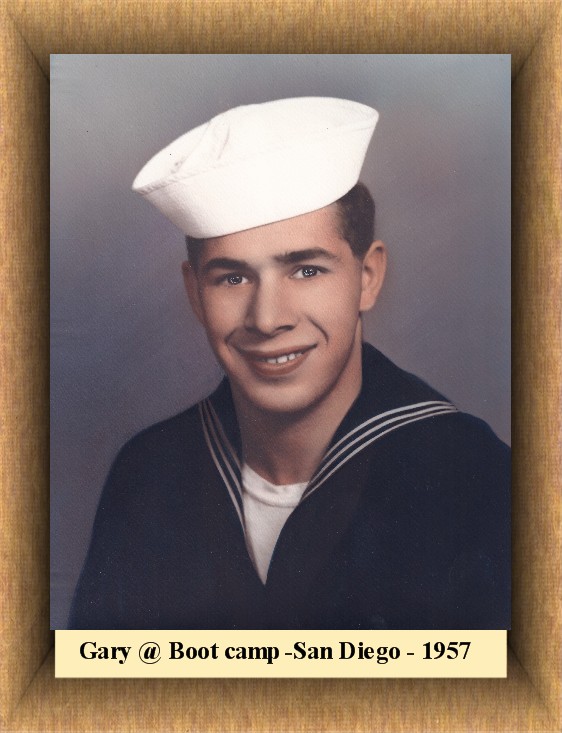
A couple of stories about boot camp:
There was a group of about a dozen guys from the Philippines who had spent a couple of months at San Diego learning English and now were placed in our company. Well our Company Commander (CC) was determined that we should earn 'Honors Company' and a large portion of that was determined by grades we got on the tests we took after each of the classes we had to take. After the first test, our company scored very low and the CC was very unhappy with all of us although the Filipinos had dragged down our grades. He suggested we do something about it, maybe more threat than suggestion. I proposed a plan. When we joined the Navy, they gave us a battery of four tests. One was basically English, one was mathematics, one was mechanical, and I don't know what the other one was, possibly electronics. I had scored highest in the company in mathematics and second highest in English. There were a few others who scored high. My plan was to select the four with the highest scores on these tests. The classroom tests were all multiple choice and the questions were flashed onto a screen in the front of the company and then we entered our answer from among four choices on the test sheet. My plan would have the four selected sit in four seats in front and nod their head forward for (1), to the right for (2) etc. and those in back could look and choose the majority opinion. After the second test the CC came in and told us he didn't want to know what we did but our scores were so high they were raising suspicion and we needed to tone it down a bit. We were able to do this and still outscore all other companies and we graduated 'Honor Company'!
I was chosen by the CC to be 'Color Guard'. This meant I would carry a flag and march out front of our company during graduation ceremonies. The good part was that I was excused during barracks cleaning in the mornings to attend training on marching pretty and handling the flag. It was always impressed upon 'Color Guard' that they needed to be dressed exemplary. Since we had to wash our clothes by hand with soap and brush and since we had no irons dry them with reverse creases, it was a task.
Well, sometime during the last couple of weeks we got to go on liberty for a day. One event is still etched in my brain. Several of us decided to ride bumper cars. It was novel for me. We picked up some speed and collided and my nice white hat went flying. By the time I could retrieve it, it was a black, greasy mess. After a lengthy time in the bathroom trying unsuccessfully to scrub it clean, I just decided to enjoy the rest of liberty and then resign myself to spend the rest of my career in the brig. As all boots do, we went to a tattoo parlor in San Diego. Even at 19 I thought tattoos stupid and although my friends all did, I did not get one. To my surprise, when we got back to base the guards did not mention the condition of my hat and I escaped from the years of time in the brig.
The "Boot" left boot camp and traveled from San Diego to Eugene on the bus. I was going to Eugene to meet Birdie who was living there with her friend, Virginia Lee. I had already broached the idea with her that we should get married. We had only delayed because of the marriage taboo of the military academies; and that was no longer a constraint. One incident occurred on the way to Eugene, at our stopover in Los Angeles. It seems like someone else was with me on the bus to Oregon, but I have no idea who. Anyway, we had some time in Los Angeles. I have no idea where the bus station was in LA, but we were walking around when a bum asked us for money. I thought it would be a good idea to not give money but to help him out; so I offered to buy him a hamburger. There was a hamburger stand nearby so we marched up and he ordered his hamburger. I wasn't paying much attention until they delivered it to him. It was raw and bleeding! He proceeded to wolf it down with blood drooling down his chin. I was about sick. I paid and got away from him and on to Eugene.
I had enough time in Eugene to buy some civilian clothes and then we got a ride with a common friend from Bandon who, unlike us, had a car and was going to Bandon. I had very limited time before I had to be in Norman, OK and that included a long bus ride from Eugene. So, we did not have a moment to spare in pulling off getting married. We had to wait for the blood test results and the blood test results came via the mail. We had wanted to be married on Veterans Day but no mail! This determined the date we were married. We weren't certain the results would come on the 12th until the mail came. It was there and once we had the blood test results the judge was willing to waive the normal three-day waiting period because I was in the Navy. We had to take my mom to Coquille so she could sign for me, for I was just a young boy.
But we got our license and headed back to Bandon for preparations. Gilbert drove me around to invite all the relatives. Nadine helped us work out the church with her pastor. We drove around and picked up flowers etc. We had to wait until 8:30 (or thereabouts) for Birdie's Mom, Jo, to get off work in Coquille and drive to Bandon. Then we did it!
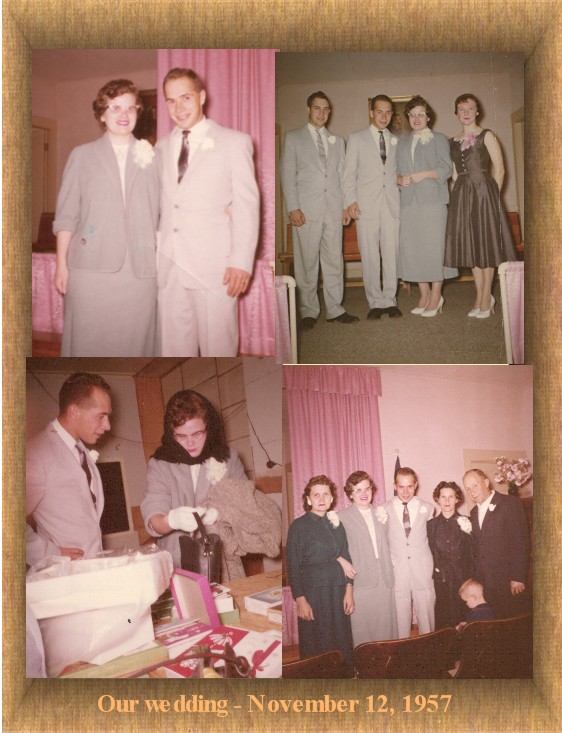
Birdie's mom said she was the calmest bride she had ever seen but little did she know; Birdie left our marriage license in the church and we had to go back the next day and pick it up - not totally calm. Then, after I was long gone to the USN, Birdie got a letter saying the marriage license was invalid because the pastor had forgot to sign it. The Minister told her he would sign it and it would be fine, but Gilbert teased her that she wasn't really married.
Dad loaned me his car after the wedding and we went to dinner at Lena's and stayed the night in Coquille. The next day, my Dad drove us back to Eugene. Then I was off to Norman on the Greyhound with the first long stop in Salt Lake. But before the bus ride starts, I should tell of one last interaction with Colonel Millard. Shortly after our wedding, Uncle Kent ran into Colonel Millard and mentioned that we had gotten married. The Colonel claimed that he could have had those results (flat feet) changed in my records. I really doubt it but as things turned out it was for the better that he didn't get the chance. The One in control knows best!
Back to my adventure. I left Eugene (and my new, lovely wife) and headed east. The first major stop was in Salt Lake where I had time to clean up, shave and change buses. It was warm in Salt Lake and my peacoat was a nuisance on the bus so I stowed it in my sea bag which was put in the luggage area under the bus. We were off for Norman, Oklahoma via Kansas and down through Oklahoma City. Everything started off good but as we got into Kansas the weather started turning ugly. We found ourselves in the middle of a blizzard and a bad one. We were down to moving at about 10 MPH. The heater on the bus couldn't keep up and it got colder and colder inside. Not a good time to have your coat tucked away under the bus. It was miserable. As we got into Oklahoma the weather started warming up and we were out of the snow. Lots of oil wells! I arrived in Norman on time, but not by much.
Norman was an introductory school for all aviation billets. The school was divided into three sections: those going into mechanical type jobs, those going into electronic type jobs and those going into clerical jobs. Because of my failed "color blind" test in boot camp, I was in the clerical group. I wanted to be in the electronic. I doubt that I knew why. I think the school was for six weeks or two months. I ended up with the top score for those of us in clerical. I met a kid named Santos who was from Brooklyn. It was like he and I were from different planets. He had been into gangs in Brooklyn and I suspect someone thought they would save his life by getting him into the Navy. He had a lot of trouble with the classes, so I became his tutor. It was a win win. I have found that the best way to really learn something is to teach it. After he got to "A" school, he sent me a letter of thanks with a sketch of how the typical gang member in Brooklyn dressed. It isn't much but good for a laugh.
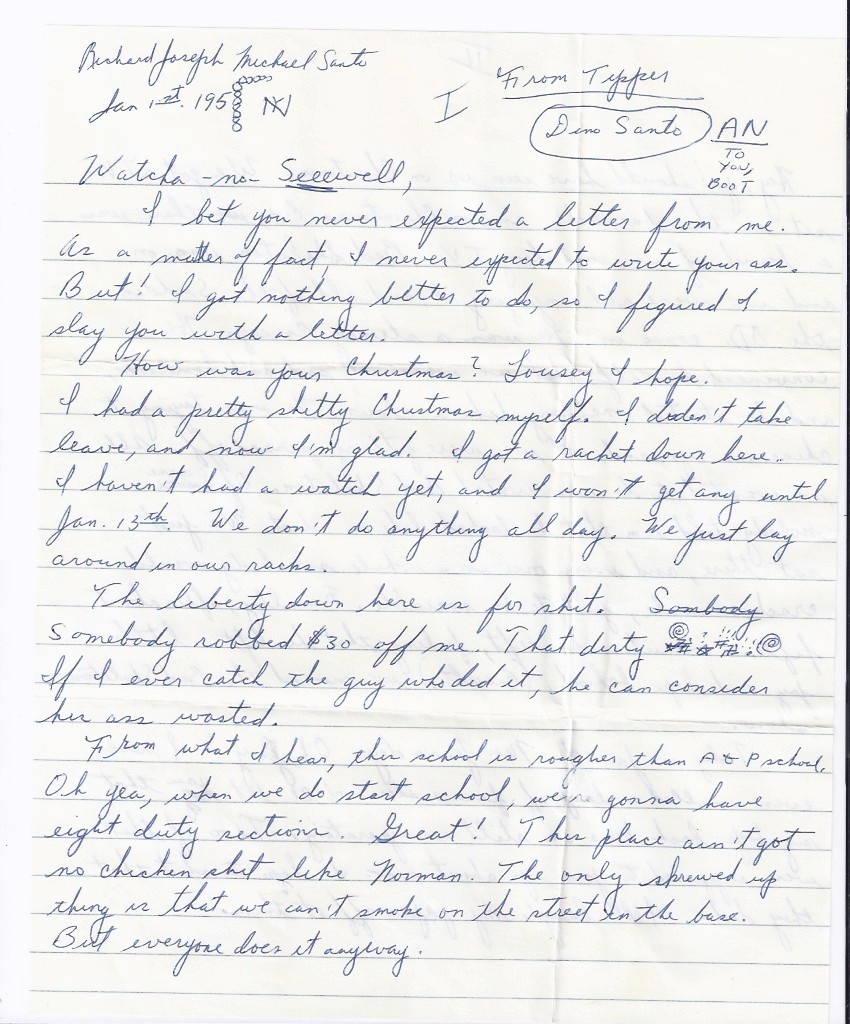
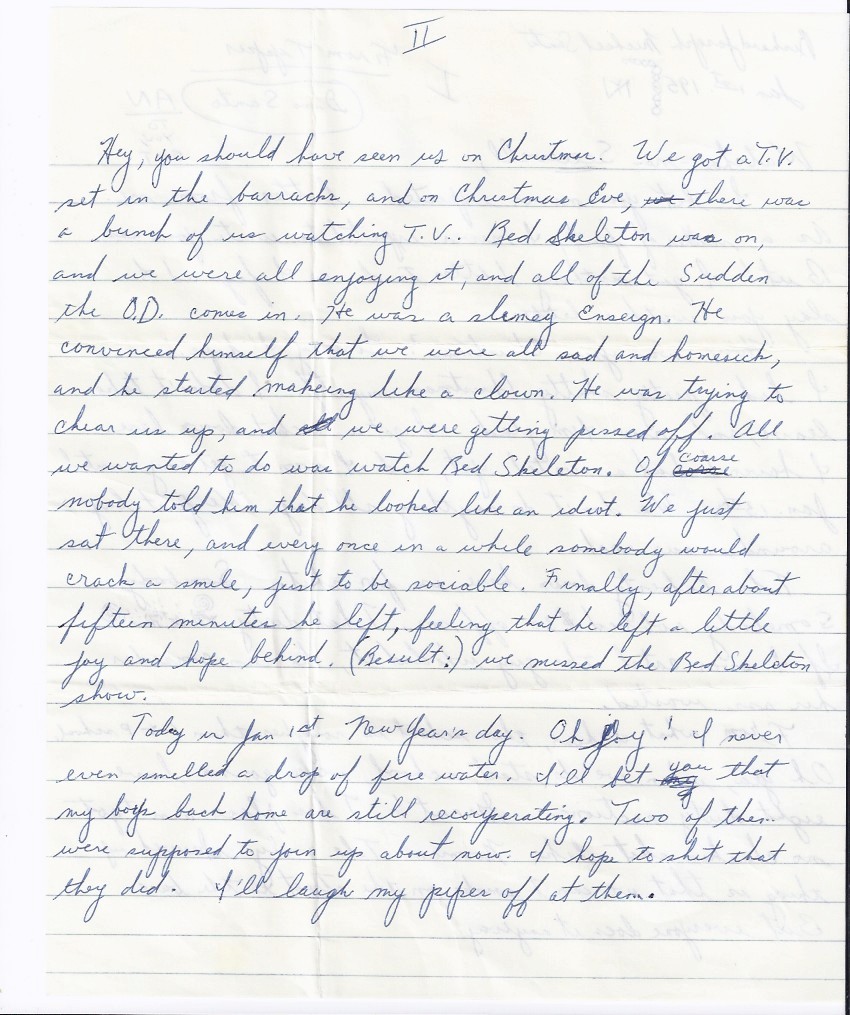
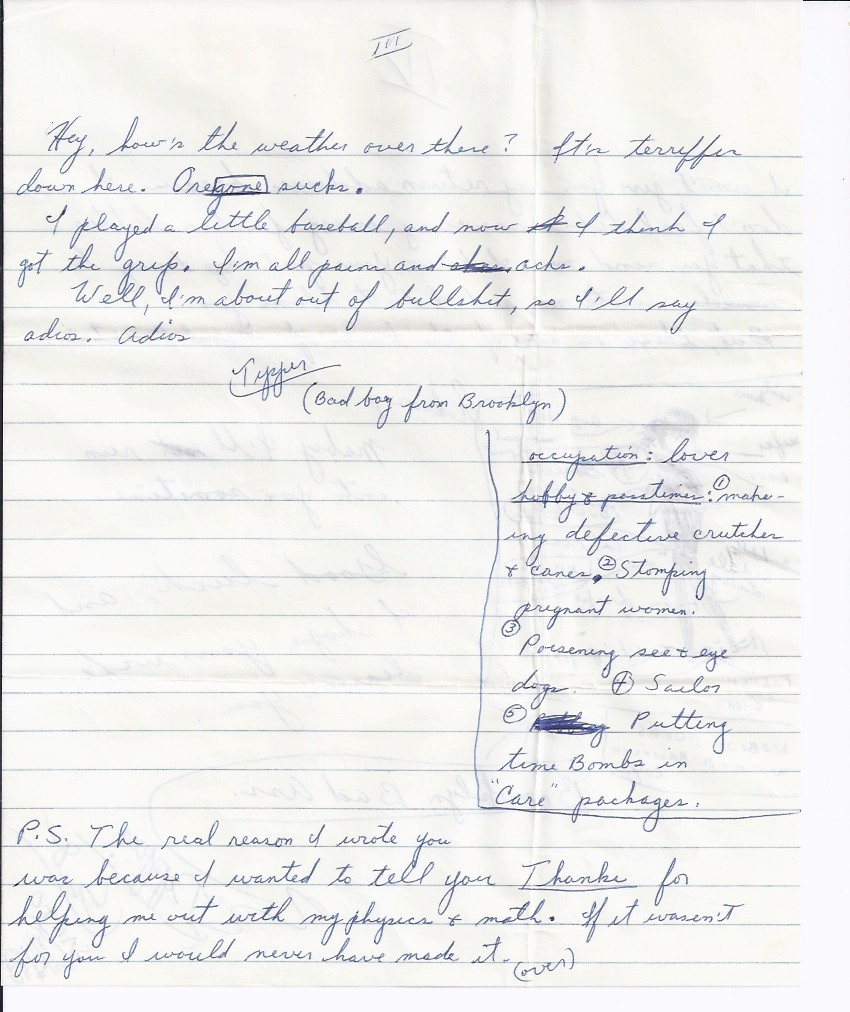
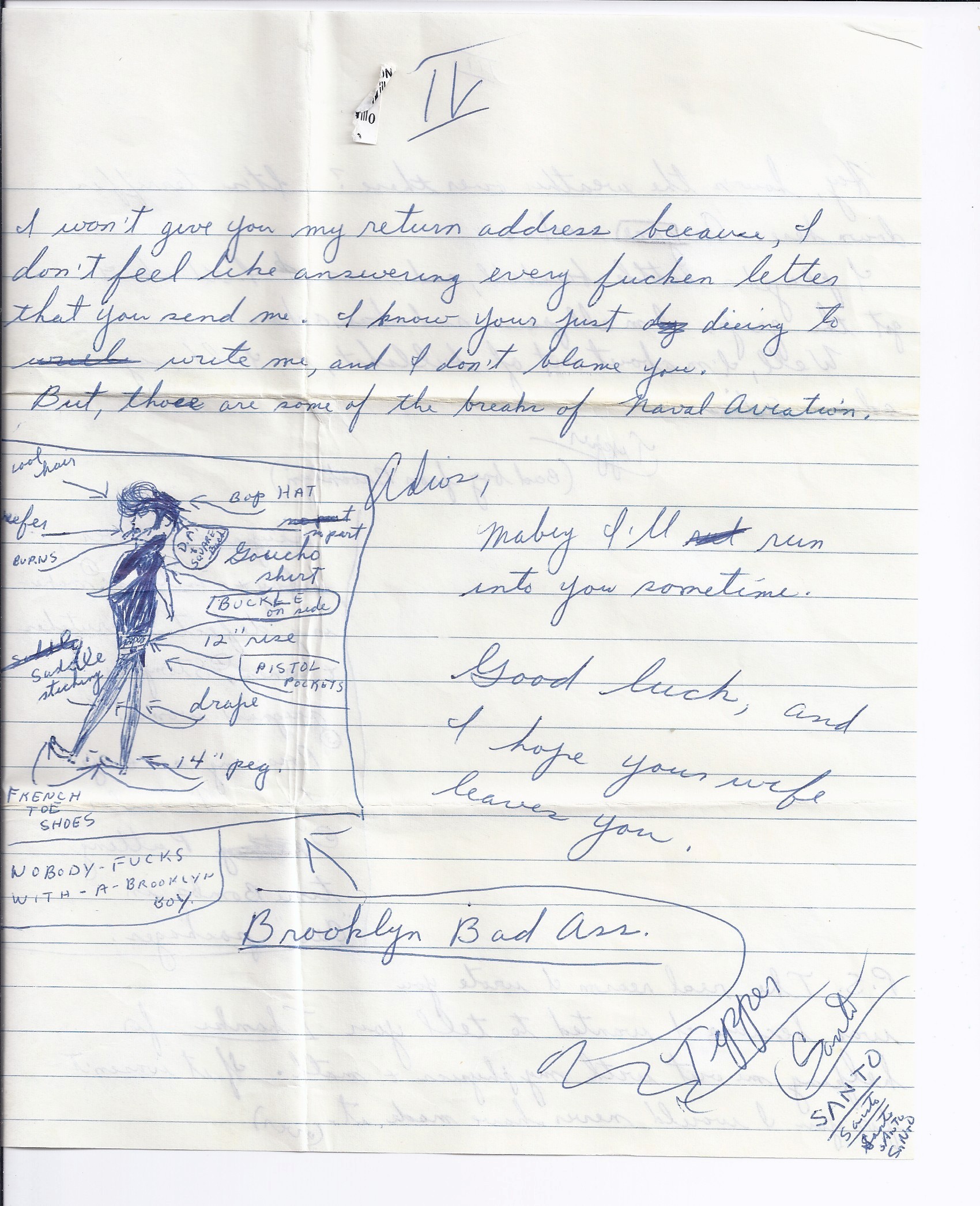
At the end of the school they had us go through another counseling session to review where we wanted to go for "A" school. The counselor told me since I had done so well, made honor man,
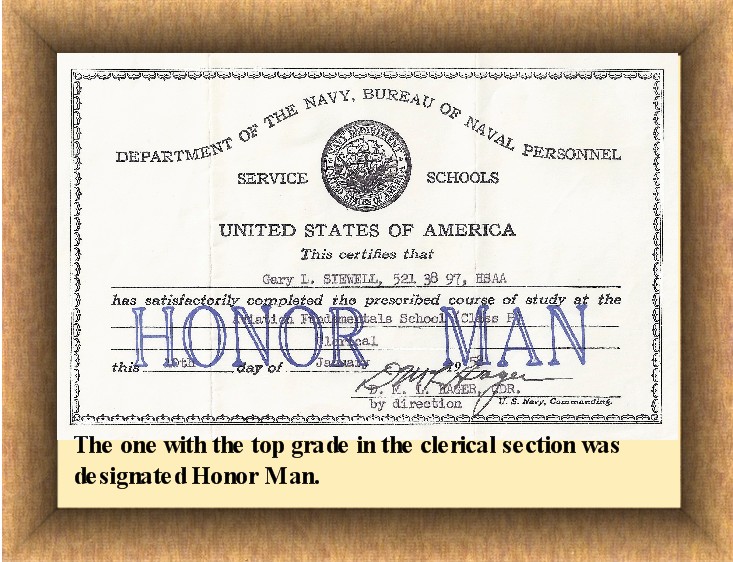
they wanted me to go back through the electronics section and switch to an electronic rating. I have never been able to tolerate being screwed with so once again I 'cut my nose off to spite my face' and told them in some acceptable way to "stuff it". However, because of my grades I got first choice of any of the clerical ratings. I chose being an airborne radar operator because of the added flight pay. I had little idea what I was getting into, but I was off to Glynco, Georgia. We (the Navy) had moved up in the world from a bus, not to airplanes of course - we took the train. It was kind of interesting riding the train through the south, but trains don't tend to go in the best areas of the cities. We had a sleeper and it was kind of fun. We played cards, slept and enjoyed the country scenery. There were four or more of us all going to the same place.
Glynco was just outside of Brunswick, Georgia and in WWII had been a base for blimps patrolling the East coast. In 1958 it was a Naval Air Station used for training. We were pretty impressed with the planes, Korean War era jets called Banshees.
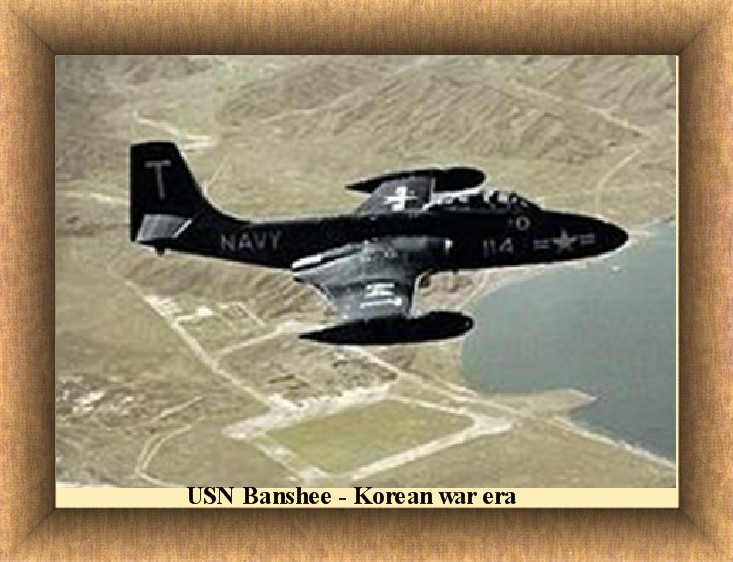
We watched them do 'touch and goes', over and over. It also had the "A" school for Airborne Radar Operators. Part of the cold war strategy was an air defense line that extended from the Azores in the Atlantic to Midway in the Pacific. This consisted of a line of radar stations in the north of Canada and Alaska called the Dew Line and then extended out into both oceans by radar equipped Lockheed Constellations which the Navy dubbed WV-2's.
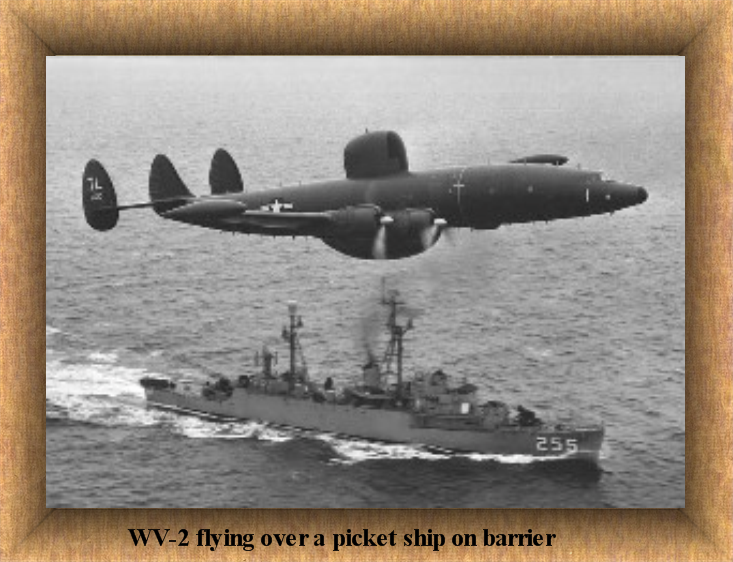
The "A" school in Glynco was to train radar operators for duty aboard these WV-2's. The curriculum included knowledge of flight rules, weather, radio communications, and hours and hours in simulators of the equipment aboard the WV-2.
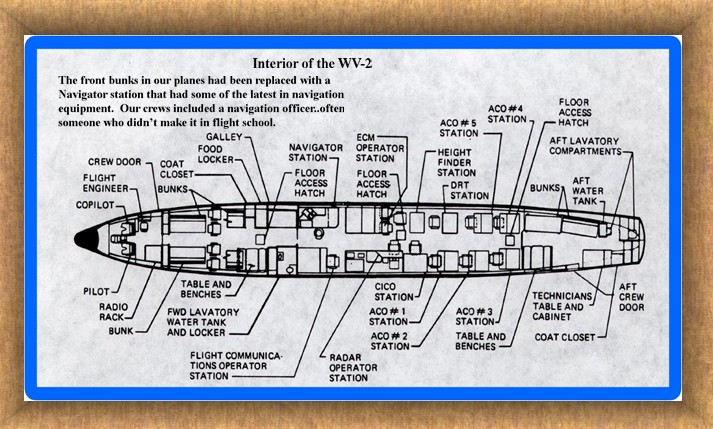
This equipment included the top air search radar with an alleged range of 250 miles (which was really good to about 100 miles), a height detection radar, electronic countermeasures equipment, radios, and a big plexiglass plotting board which we had to learn to plot from the back and so write backwards.
Not long after I got there, Birdie and I began plotting how we could get her out there. We had little money, no knowledge of where I was going next, no place to live, but we missed each other and that overcame all else.
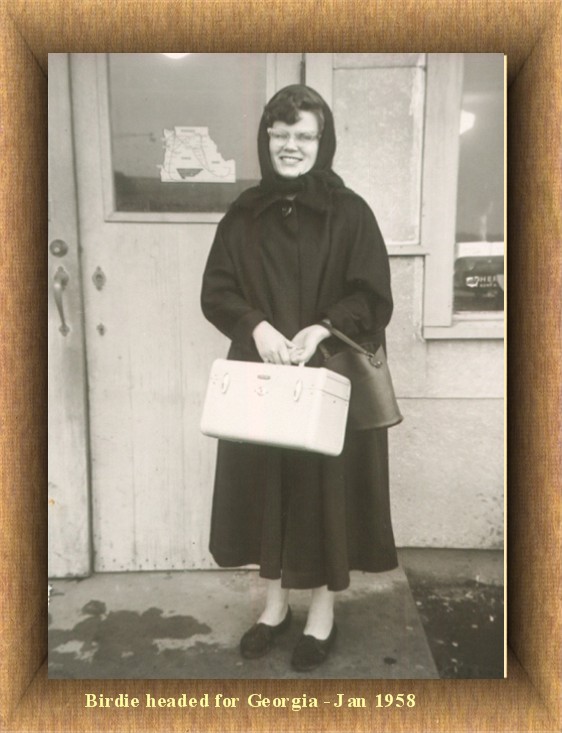
Birdie was on her way and expected to arrive on a Saturday and we had no place to stay. I went to Brunswick and found an apartment that was on the second floor of an old house that no doubt saw the civil war and probably several years of the build up. Then I went to the Oglethorpe hotel and rented a room for one night that was on the ground floor and was just a narrow room with a small bed and a bathroom (very Spartan). Then I was off to Saint Simons island in a taxi because that was where the plane came in. Birdie arrived in an old DC-3 which she had flown the last leg from Atlanta. Airline travel was not very developed at that time and she had flown from North Bend to Seattle to Chicago to Atlanta. On the Seattle to Chicago leg, Birdie hooked up with a 10-year-old boy whose parents sent him off to a boarding school and he was returning after a rare visit home. He knew the way around the Chicago airport which was pretty intimidating to Birdie (about a mile walk to catch the next flight) and he was going on the same plane so he led her to her flight and traveled part of the way to Atlanta. In Atlanta she was on her own and came face to face with segregation. She sat down in the terminal in an area that happened to be for blacks, and she was told by an employee that was not where she should be and requested that she move. She managed to get on the right flight to Brunswick. When she arrived we took the taxi into town and spent the night at the Oglethorpe, a real old and once elegant hotel but not so much in 1958 especially the rooms for sailors at Glynco.
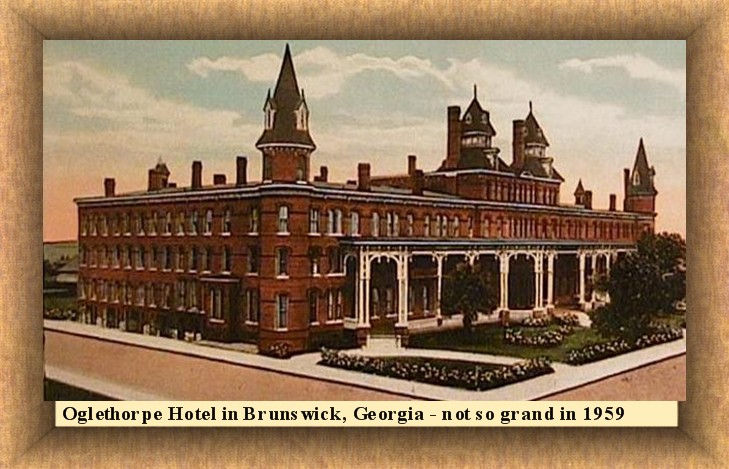
The next day we walked around Brunswick so Birdie knew a little bit of her way around and we checked out the apartment.
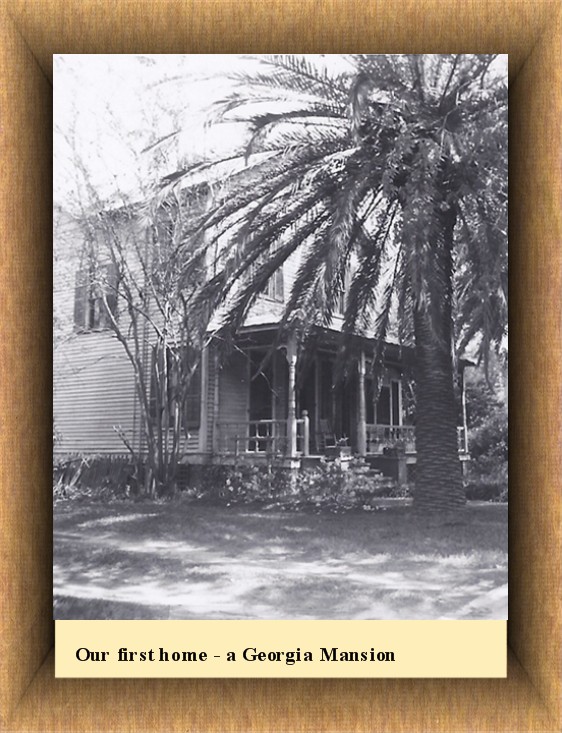
That night I had to go back to the base and stay and Birdie had to stay in the apartment by herself. She had no blankets, sheets etc and slept with newspapers and her coat. The next day I made arrangements to live off the base and she did some shopping for the bare necessities using the money ($100) she had brought with her. I didn't even make $100 a month.
Then we settled into our apartment, the beginning of our married life. Both of us were middle children and not the favored one in our families. Being 3000 miles from any relatives meant we had to work out all problems on our own. We became very independent, probably to a fault. We never have relied on family or friends, just ourselves. We were probably in our seventies before we discovered we didn't know as much as we thought we did when we were young. We enjoyed our time in Brunswick. We didn't have a car, so we walked everywhere. Birdie read a lot. We went to the movies.
Our apartment was just two converted bedrooms; one having a stove and refrigerator with the closet containing the sink and cold water only. Warm water was a luxury and the landlady made no bones about the fact that we were to use very little, only for bathing. The second floor of the old house had three apartments and one common bathroom. The bathroom was two rooms: one with a toilet and one with a tub. So, bathing didn't block up the toilet. One appliance of interest was the heater. It was warm in Brunswick so there was no central heating. We had a small gas heater that looked like a portable heater but was plumbed into the gas line. It was difficult to get lit and required lighting a piece of paper, turning on the gas, getting it started without it exploding, and then getting the paper put out. Birdie didn't light it when she was alone. It was probably about as old as the house.
Birdie had birthday #20 in Georgia. Birthdays had never been a big thing at my house, so I let it slide without a mention. Bad move! Birthdays in Birdie's home had been a pretty big thing. She started crying and before long I regretted I hadn't planned a celebration! Our first marriage crisis.
Birdie had some more experiences with segregation. While in a grocery store she wanted a drink and there were two fountains. One had a scraggy old man getting a drink and she didn't want to drink after him, so she used the other one. One of the black workers in the store told her that was the fountain for the blacks, and she should use the other one. Also, she once told the colored bag boy "thank you" and he was in shock and didn't know what to do. Our landlady was prejudiced. Once when Birdie was down paying the rent, she was talking about a murder that had occurred and she was telling about how "those niggers were at it again". Birdie noticed that the article said it was committed by a white person and when she pointed it out to the landlady, she said "well maybe so but those niggers made them do it". We were shocked since in Oregon we had no experience with segregation, very little contact with African Americans at all. Our apartment was very close to a Christian church which was a nice large brick building. Next to that church was a small shack which was where the colored went to church. We didn't attend either.
Birdie likes to tell the story of planning her grocery shopping so she would be getting done about the time I came home. So, I could walk with her and help carry the groceries. She alleges that she would come out of the store when I was just a little ahead of her and that I didn't look back, even when she called out. I have no recollection of this!
We spent a lot of time laying on the bed and her running through my study material asking questions. She also learned about weather (different kinds of clouds etc) flight rules (rules for VFR etc), the military alphabet (alpha, beta, Charlie, dog, echo …), and a bit of everything I needed to learn. She probably could have passed the class.
The students were not allowed to have civilian clothes on base so a couple of my friends kept their civilian clothes at our apartment and when off duty they came by and changed their clothes and then again when ready to go back to base. One of them was a southerner and one a northerner and these two were constantly arguing about which was best, the North or the South. We claimed to be from the West which was better than both!
While Birdie was getting some experience in segregation, I got a bit of a lesson in something else. It was several miles from Brunswick to the base and I usually took a Navy bus. However, on occasion I would be late getting out of the apartment and would have to hitchhike. One time a fellow picked me up and we started toward the base. We hadn't even gotten out of Brunswick when naïve me started putting together what he was saying. He was gay as could be, in those days we called it queer since it is. I knew about queers, all boys do, but I had never experienced one up close and personal, too personal. I told him to stop the damn car and let me out immediately. He did. I don't remember clearly but I suspect I got better at catching the bus after that!
In early spring the bugs started coming out. We weren't that far from Florida swamps. Sometimes while walking we would run up against a swarm of gnats so large we had to go out into the street to get around them. We were ready to leave Georgia. I had been the top student in our class, so I had first choice of any of the squadrons that flew WV-2's. There were several squadrons based in Hawaii which deployed to Midway and flew the barrier between Midway and the Aleutians. There were the three squadrons that were home based in Patuxent River, Maryland (PaxRiver) but who deployed to Argentia, Newfoundland and flew the barrier from Newfoundland to the Azores. And there was one squadron, also home based in PaxRiver, which flew early warning for the Atlantic fleet and deployed occasionally to Malta to support the fleet in the Mediterranean. I was intrigued with Hawaii, but the problem was how to get Birdie there. The Navy wouldn't pay to move her until I made E-5 and I was only E-2. But the decision became easy for me when just before we graduated, a WV-2 went down in the Pacific and a bunch (I think 16) of the crew were eaten by sharks. I chose AEWRON TWO which was the squadron that supported the fleet and flew in colder waters. Flying those barriers were about thirteen-hour flights every few days and it sounded awfully boring. Turns out to have been a good choice. We were off to Maryland.
The first hurdle was we had no car. Birdie still had some money in Oregon she had saved up while working at the M&L grocery in Bandon. We had her Mom wire us $400 and we bought a 1952 Oldsmobile Delta 88.
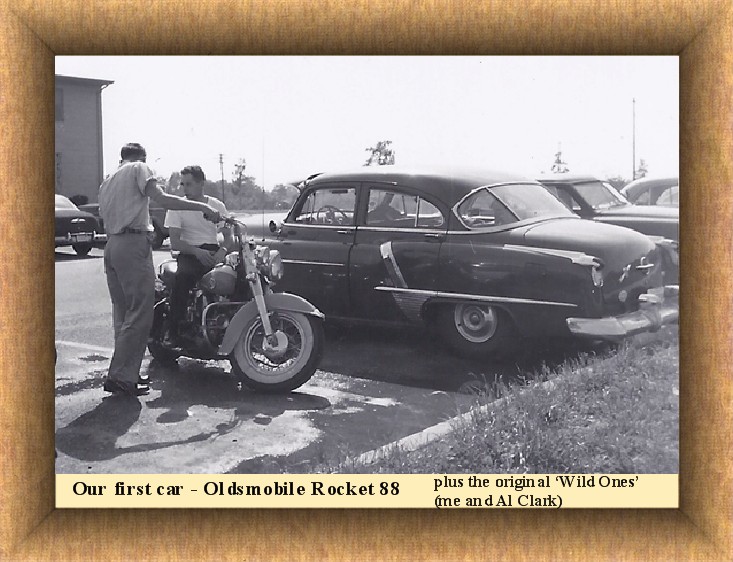
We put all our stuff in the back seat (didn't need to use the trunk). The salesman had told us it was owned by a little old lady who never took it out of town. We had barely gotten out of the city of Brunswick when it started overheating. I suspected we had been conned and had a lemon. I got out to look for the problem and discovered that the 'little old lady' had put a piece of cardboard over about two thirds of the radiator to get it to heat up quicker. I removed the cardboard and we had no more trouble. Maybe that salesman was telling the truth. We headed north. Well we were supposed to. On one occasion I was taking a nap and Birdie was driving. The highway had an exit that was so gradual it was not easily detected as an exit rather than just another lane. Anyway, she took that exit and it headed west. I woke up and we had gone about 100 miles out of our way toward Oregon. That is the last time I have ever slept while she drove. We corrected and got back on track. We observed a couple of things in the South that we thought remarkable at that time, probably be more remarkable now. One was that people just hung bags of pecans or large hams on a hook by the road and people could just stop and buy them and leave the money. Another time we went by a small field that a young girl was plowing behind a mule. Her father was an old man with a long beard sitting in the rocking chair on the porch with his pipe in his mouth and his bottle of moonshine cradled in his arm. It was a picture out of the history books.
We arrived in Lexington Park, a village that had grown up outside of NATTC Patuxent River, Maryland. We rented a modest little apartment that was in a new development on Chinlee Drive.
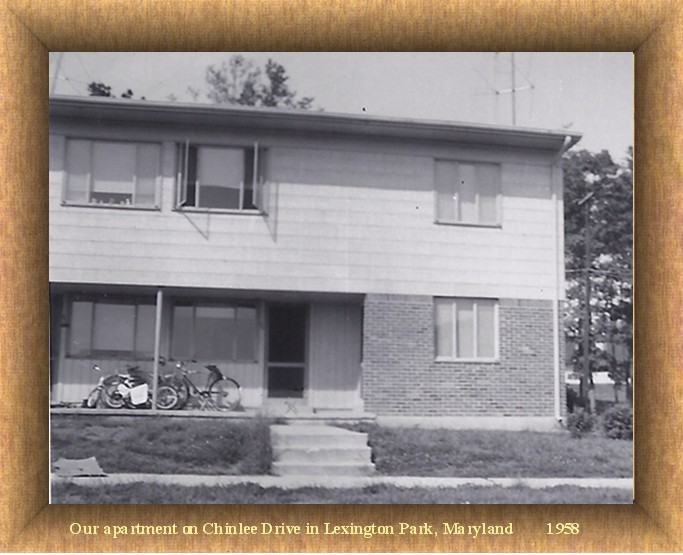
It wasn't very expensive, but it turned out to be more than we could afford so we only stayed a month or two there. We got so low on money we were living on Snicker Doodles. We played games and ate Snicker Doodles. We ended up playing lots of games in Maryland. We played the Navy game, Acey-Duecy and we played Battleships. (Battleships was a game played by the Navy long before it was a gam sold in the stores) We made a series of parallel lines on paper, both horizontal and vertical. We labeled one axis with letters and one with numbers, just like the modern version and then we just drew our ships in and then took turns bombing a space. I usually won, well almost half the time. We once played a card game called "high, low, Jack, Game" but I caught Birdie cheating, so we had to stop playing that. There is evidence we did other things besides play card and board games!
After that we moved a little farther out of town into an older complex of apartments and trailer houses called Springhill. We rented half of a duplex that had one common bathroom. The other half of the duplex was rented by some relatively old fellow and it was no problem except later when I was deployed to Malta for two months and Birdie had to live there by herself.
A couple of details about the deployment to Malta: The base at Malta was an English WWII air base. The runway was short and in one direction it ramped up just before it ended at the edge of the cliff that dropped over a hundred feet to the sea. The other end of the runway ended at the edge of farm fields which gradually rose from the end of the runway and had a maze of fences made from rocks that had probably been piled there since Saint Paul's visit. When fully loaded, we could just make it off. In fact, when I went over there the first time, we relieved a crew that had their plane loaded to the hilt (the aisles full of popular, large Grundig stereos). As they left the ramp at the end of the runway they dropped down over the cliff and were out of sight so long we thought they may have gone in, but they finally came back into view; slowly gaining altitude and making their way home.
The British flew a bunch of odd-looking planes, at least odd-looking to us. Most of them were small little jet fighters, but one was a monstrous dual propeller, counter rotating whining beast. We stayed in Quonset huts on Malta, each hut large enough for about eight or ten guys so our entire CIC crew was in one hut. Note on Quonset huts: these were a WWII design that were corrugated steel and the shape of one half of a huge cylinder with the 20-foot diameter on the ground. The floor was concrete pads and there were walls with doors at both ends. I think it had windows but am not certain where. We spent most of our spare time playing poker. We played low stakes, just for fun but there were serious games around the base. We occasionally got up a football game. The base had a British radio station that played music all day. One of their favorite songs, which I liked, was the Australian song "The pub with no beer".
My first cruise to the Mediterranean was early summer of 1958. Our boondoggle, as the Navy might say, was to Barcelona and Palma De Mallorca. At Barcelona we landed at the commercial airport and then taxied to the section belonging to the Spanish military to park the plane. Our plane had lots of highly classified equipment, so we always had to guard it. For the night in Barcelona the guard duty fell to the lowest ranking member of the crew and that was me. So the crew headed into Barcelona.
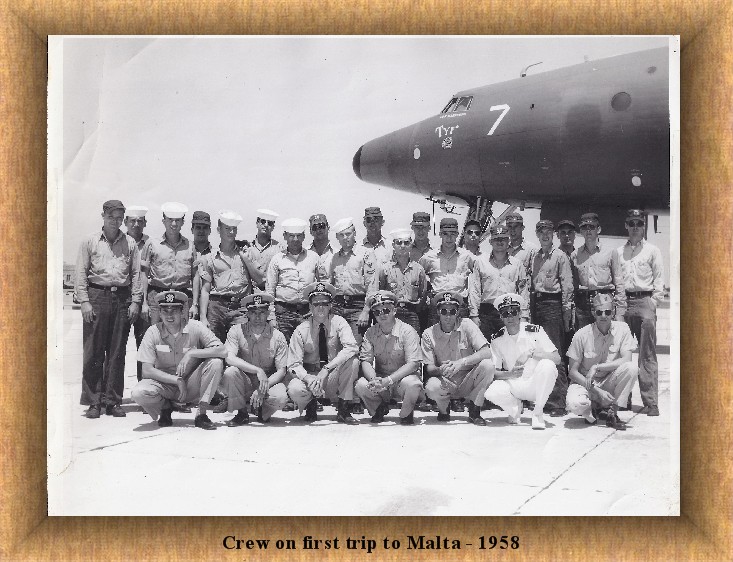
I was dressed in my flight suit and I put down the ladder from the back door and went out to walk around. I was amazed they had a few old Korean war vintage Saber Jets parked near and they had an armed guard walking around them as if someone might be interested in such old planes. Not long after, a few of the Spanish soldiers came over to visit. Naturally I had cigarettes and they were pleased I shared with them. I had also converted some money into Spanish money in anticipation of going into Barcelona and Palma. We had quite a language barrier but somehow we agreed I would give them some money and they would buy wine and one of them (a cook in their army) was going to make sandwiches. I gave them a Spanish bill I think was worth about 4 or 5 dollars. They came back with several containers of wine and sandwiches and a surprising amount of change. I invited them into the plane, which of course was not what the Navy expected of me, but it was good international diplomacy and we sat at the dining table in the plane and had a mini party. The wine containers had a long-curved neck which they held up and tilted until a stream of wine arced out and into their mouth. It seemed sanitary so I experimented with progressively more success. I drank a bit more of the wine than I should have and finally we ended the party and they left, and I pulled the ladder up into the plane and locked the door and went to sleep. The next morning the crew came back and they had a hard time getting me awake. They weren't very pleased; one of them had to climb onto the wing and pound on the window. It was also noticeable looking at the red stained flight suit I still had on that I hadn't mastered the wine drinking as well as I had thought. But the crew was pretty good about it and we were soon off to Palma.
In Palma I got to go into town, and we stayed at a nice resort hotel. Me and a couple of others got the idea to rent scooters and tour the island. So, we went into this scooter store and rented three nice, practically new, Vespa scooters. We learned to ride them as we went. We were only about half a block away before me and one of my friends side swiped one another and went sliding down the street with scooter parts flying in all directions. The scooters were still ridable, so we continued our tour, which was very interesting, a lot of old Spanish architecture and old Spanish churches. We didn't stop, just observed. Once going up a hill on a gravel road my scooter started running out of power and I shifted down and gunned it and it did a wheelie and I had to jump off to keep it from going all the way over backwards. Only slightly more damage to the scooter. When we returned them, I was expecting to have some serious damages to pay but it was only a few dollars, quite worth the adventure.
On this boondoggle we also visited Venice, Pisa and Florence. We landed at Pisa and took the train to both Venice and Florence. We also made a side trip from Malta to Wheelus AFB @ Tripoli, Libya. On the way home we landed at Gibraltar, the NAS at Port Lyautey, Morocco and Lajes AFB in the Azores. I don't know why we landed so many times unless one of the officers was looking for something to take home.
Upon returning to PAX there was one duty that had to be done by the lowest ranking two members of the crew before they could greet their wives, empty the honey bucket! That was a shitty job, but someone had to do it. Then I could go and greet my wonderful wife.
An interesting story occurred after the deployment to Malta. On the way back we had stopped at the Lajes Air Force Base in the Azores and we had purchased tax free booze to take back. A few days after we were back some friends who had gone over with me came by for a visit. They brought a 40 oz bottle of Canadian Club and we got snockered, me worse than them. In fact, I got sick. They felt bad and tried to help Birdie clean up the apartment. After she got rid of them, she stuck me in the shower, clothes and all, and turned on the cold water, cold only! She didn't show much compassion for me when I over did the drinking back then; and in that regard, she hasn't changed for the better over the years. I started telling her that I had something I had to tell her. She was sure and afraid I was going to confess some mishap over seas. When she finally was ready to listen, I confided to her my secret: "I'm cold!" And I was!
Our neighbors were a navy couple, both in the navy, who rented the trailer right next to our duplex apartment. They were nice neighbors and they had a television he had pretty much built or at least it looked homemade. They were being transferred and they helped us work it out so we could get their trailer when they left. And they left us the TV. That was the first TV we owned. It wasn't much and took a bit to keep it going. I learned quickly how to take electron tubes of various types down and test them and replace them. But we had a TV!
We had a couple of friends at the trailer court named Gene and Harriet. They were from Louisiana and she was pregnant and was due before Birdie. They didn't have a car, so we had agreed to take them to the hospital when the time came. Naturally the time came in the middle of a real cold night. Gene came over to tell us that her water had broke. I got up and went out to start the car and the windshield was frosted over. Thinking it would be quicker than scraping, I got a bucket of water and threw on the windshield. It could get awfully cold in Maryland and that night it was too cold for that technique. I ended up with about a half-inch sheet of ice. I managed to get it cleared and we got Harriet to the hospital in time. It was no doubt this experience that turned out to haunt me later as I hardened and developed the ability to stay calm in the crisis surrounding a birth.
I hadn't been back from Malta long when the Lebanon Uprising (1958) occurred and we needed to send a third plane over (we normally kept two planes and crews deployed in Malta) to monitor the air traffic around Lebanon. My crew was selected. We were deployed from Malta to Souda Bay, Crete and flew out of there. The base at Souda Bay was just being built and it had no facilities other than a runway, an empty building, and refueling capability.
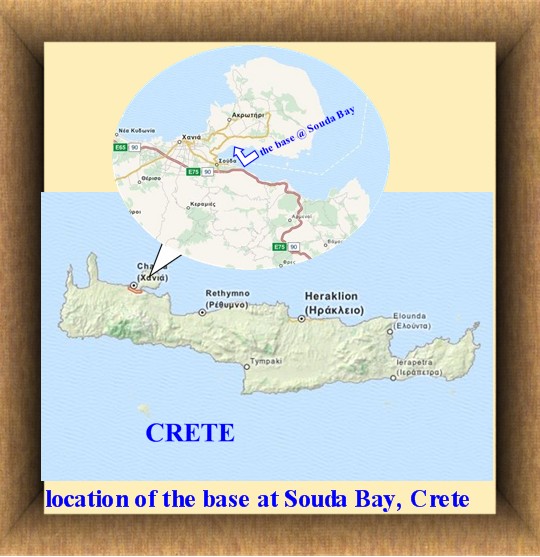
We put up cots on the floor (after we ran the geckos out) and the Navy brought in an LST which acted as an Exchange and to sell us beer.
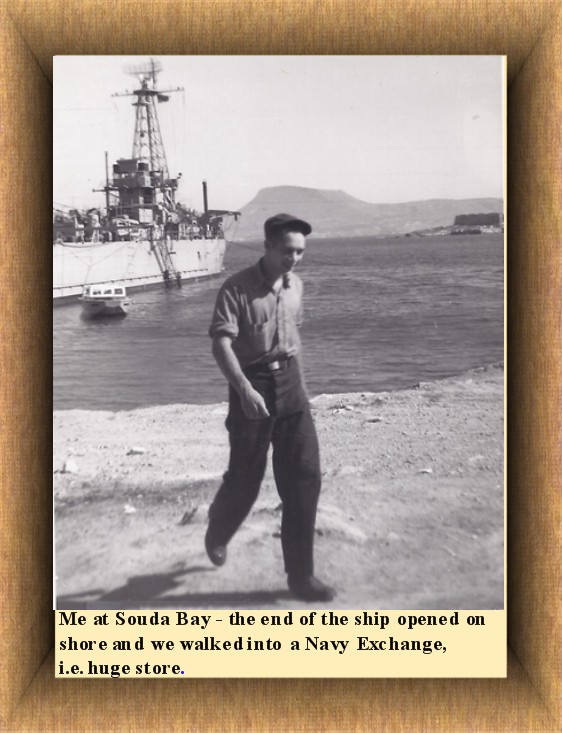
We flew patrol off the coast of Lebanon and there were both Russian fighters and US fighters prowling the area and we watched them on our radar, but they stayed away from each other. Note: Navy still has an operation at Souda Bay (2013)
Birdie was pregnant when I went back to Malta and we had just moved into the trailer. I had a new tank of propane installed before I left so Birdie wouldn't run out and have to do it. However, the fellow who installed the tank didn't get it leak free and the fumes just outside the window of the trailer caused her to be sicker than she should have been. I finally had her have someone check it and it eventually got fixed but not before it caused her a lot of misery. It took mail about two weeks to go each way between us so solving the problem took awhile.
On our way back we stopped at Port Lyautey, (Morocco) again. Our plane,940, had just been delivered from Lockheed when we started the cruise and, in fact, the civilian rep from Lockheed went with us.
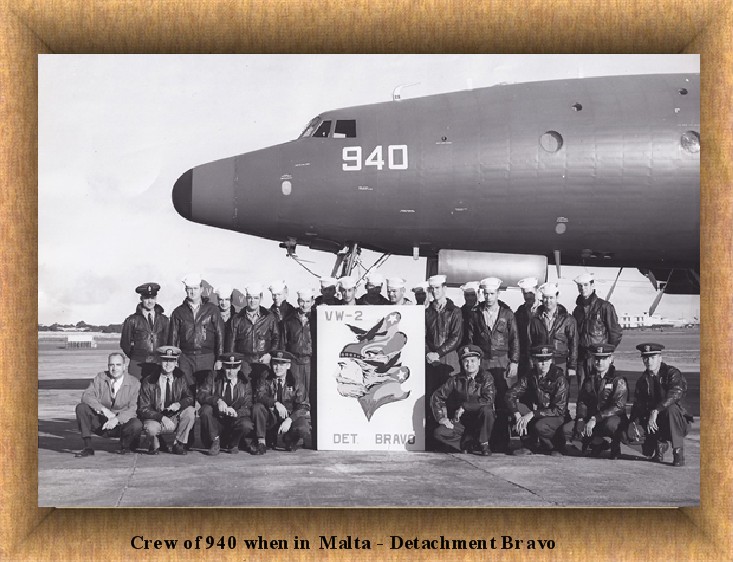
On the take off from Port Lyautey for our last leg home we ran into a flock of birds and they went into the oil coolers and started immediately overheating the engines. Two of the engines had to be feathered and one of the others was starting to overheat but we made it around and landed. The plane could maintain altitude with two engines but not one. Besides the plugging of the oil coolers, the birds had also caused quite a bit of damage to the leading edge of the wings and the deicer boots. We were a bit surprised that the leading edge was repaired with tape (I think it was duct tape). It took two or three days to clean up and repair and so we were late getting back. Birdie says she was taking a bath and shaving when they called to say I would be late, so she stopped and cried and finished a few days later when our arrival was imminent. No wonder we had so many children.
I came back and on May 1 she had Mark. I made a couple of mistakes in the process that have become family folklore. Both were from my natural cool and calm demeanor and not showing the proper urgency for the situation. Birdie had started having pains the day before and when she was down getting ice cream from the ice cream man a neighbor lady asked her if she was in labor. She was still having pains the next morning, but we were inexperienced, and we didn't know real labor from false labor, and we weren't convinced it was imminent, so I went to work. But I was worried, so I got the day off and came back home. Meanwhile Birdie had had the bloody show and was starting to panic since we had no phone and she wasn't sure what she should do. I came back just in time. So far, I was doing okay. We packed up and started for the hospital. I realized this ordeal might take a while and I was short on cigarettes, so I stopped and bought some. Mistake one! You only stop on the way to the hospital when forced to by the police for showing proper urgency and speeding recklessly. We got to the hospital and they put Birdie in a bed and the doctor gave me a clock and told me to time the pains. I was tired and when the doctor returned to hear the results, he found me asleep - just a short nap. The doctor was not impressed! Neither was Birdie! Mistake two! She kept these two things in her heart, and these would become stories she would tell and retell for years, nay decades, to come. But due largely to my remaining calm and cool throughout the entire process, Mark was born without mishap. When I first went down to see him, there were a bunch of little ones in the nursery, but I knew immediately he was the one with the wrinkled forehead. He hadn't been cleaned up yet and was covered with blood and white crud, but he was still by far the cutest one in the nursery.
They kept them in the hospital for five days. The biggest surprise was that the day she came home, she went to the Commissary while I watched Mark, and Grandma Jo made a surprise visit.
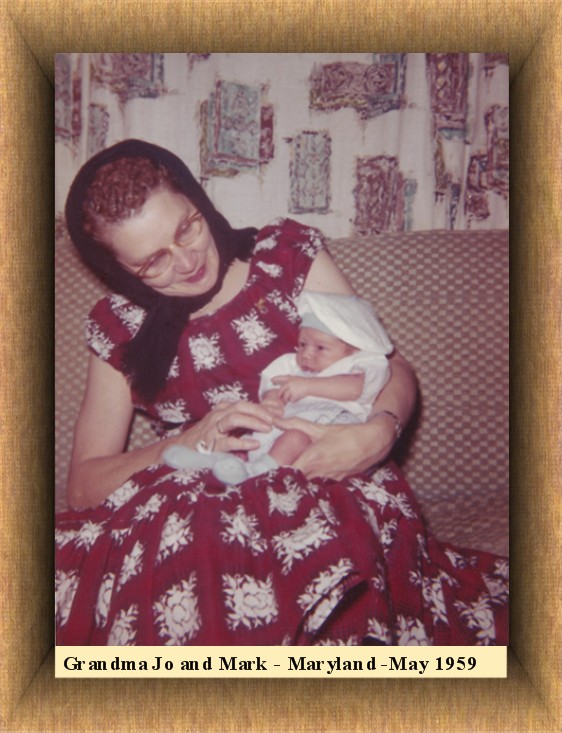
She hid in the bathroom and when Birdie came home she surprised her. We enjoyed her visit. Everyone competed for time with the new baby.
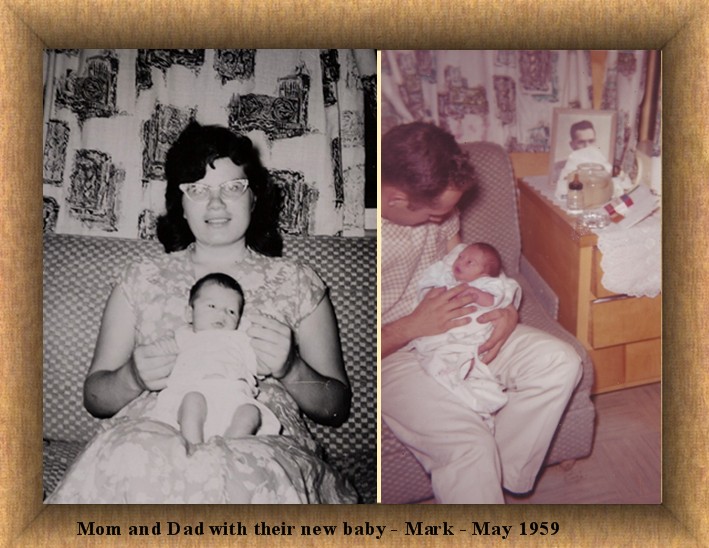
That was quite an adventure in those days to come all the way from Oregon. We were pleased.
After Grandma was gone and we settled down to caring for the baby, we had trouble with the feeding. Mark was working hard at it and we were feeding him almost around the clock, but he wasn't getting enough. Luckily the Navy realized that they had a bunch of novice parents who didn't have a clue what they were doing and were too far from their parents to ask them. So, they had a roaming nurse who made home visits to new parents and her visit to our house probably saved Mark's life, or at least allowed him to grow to normal size. The bottles that we used to feed babies in those days were glass bottles with rubber nipples (the collapsing bag hadn't been invented yet) and the nipples had small holes in the seal area that allowed air back into the bottle as the milk was drank. It was critical to use a toothpick or some way to clean out these holes or dried milk filled them and stopped the air flow and created a vacuum in the bottle. The vacuum in the bottle increased as the baby drank until the vacuum created was enough that the baby couldn't overcome it and get milk. That was our problem. We didn't know about the air holes, so the more Mark worked the less he got. Once she taught us to clean the holes, we were off and running and Mark was a happy boy. Had we caught it earlier he may have been as tall as Kareem Abdul Jabbar.
Back on the base there were a bunch of us radar operators and when not flying there was not enough to keep us busy. So, we had a false room made by adding a wall in the middle of a large room. Then some could be out front working (or pretending) while most were behind the wall playing "Acey-Deucy", the favorite Navy game. We had operational or training flights about once or twice a week and then occasionally deployments. I didn't start keeping a log of my flights until the beginning of 1959 and by then I had been to Malta for two cruises. However, I will list entries in the logbook for the first half of 59 to give a flavor of what we did:
Jan 20 Test hop for 1 hour
Jan 21 supposed to fly an Op hop but radar gear down..stdby all night..no flight
Jan22 Operation flight (op hop) …13.5 hours
Feb 4 Pax to Argentia 4 hours
Feb 6 Barrier flight 12 hours
Feb 8 Barrier flight 12 hours
Feb 11 Barrier flight 12 hours
Feb 13 Barrier flight 11 hours
Feb 15 Barrier flight…snow at Argentia landed at Harmon AFB (Gander) 14 hours
Feb 17 Barrier hop ..Harmon to Argentia 12.5 hours
Feb 18 Argentia to Pax 6.5 hours
Mar 6 Op hop 5 hours
Mar 11 Op hop to monitor flyoff of a/c from USS Forrestal 8 hours
Mar 17 Monitor posit & movmnts of ships in the Wallops Isl. missle launch area 8 hrs
Apr 3 check out new equipment on USS Saratoga 5 hours
Apr 10 jamming exercise off east coast 4 hours
Apr 29 Jamming exercise off Norfolk, landed NAS Oceana 2 hrs…5 hours
26 May Test Op for Fleet exercise off east coast 2 hours
27 May Pax to Jax (Jacksonville, FL) 5.5 hours
28 May Op hop 7 hours
29 May Jax to Pax 2.5 hours
5 June CIC trng hop 6.5 hrs
12 June Air Defense Exercise (ADEX) 9.5 hours
15 June ADEX 10.5 hours
17 June ADEX 10 hours
20 June LANTFLEX two engines went out 7.0 hours
21 June LANTFLEX lost one engine(feathered) 6.5 hours
24 June LANTFLEX lost our radar 7.0 hours
24 June LANTFLEX 5.0 hours
30 June Missle sweep (Wallops Island) posit & mvmnt of ships..4 hours
I was known as the best "bogey finder" in VW-2, bogeys being unidentified or enemy planes. Probably one of the reasons was good eyesight, but the main reason was that I wanted to be. I took my job serious and I worked hard to be the best. Others thought the Navy was a bit of a joke and didn't take it too seriously. One story of my third and last trip to the Mediterranean demonstrates both points of view. We were doing an exercise with the fleet in which they were expecting to be attacked by a plane carrying a nuclear bomb. Our job was to detect it in time for it to be intercepted before it got to the fleet. I was working one of the consoles for the search radar. I knew the Navy had an air base at Rota, Spain and the likelihood was pretty good the 'attack' would come from there so I was focusing on the coast of Spain where a plane from Rota might cross. The pilot of our plane was the ultimate command leader and he had moved closer and closer to Spain (away from the fleet) in hopes that it would help us detect the attacking plane before the shipboard radar could. I don't know if the CIC officer had proposed this or not. Although enlisted operators were trained to do intercepts, the CIC officers were the only ones who might ever have the opportunity. It was almost never that they got a chance (the ships usually kept control of their own CAP, Carrier Air Patrol or fighter planes that the carriers kept in the air for intercepting any incoming enemy planes) and our CIC officer was anxious for a chance here. I detected a bogey coming off the coast of Spain that was travelling about 600 knots and we determined he was at about 35,000 feet (when we had a bogey on our radar, we could put the cursor on it and hit a button and he would be sent to the height finding radar and the operator there would determine altitude) and he was headed toward the fleet. I reported it to the CIC officer (I had to get up and go find him because they were seldom in the CIC area). Each unit had a letter designation by the fleet and bogeys were labeled by that letter plus a sequential number. We were Lima so this became Lima 1. He came back and tried to contact the fleet to report Lima 1, but we were too far away and we couldn't make radio contact. The pilot immediately turned and started directly towards the fleet in order to establish communications. I meanwhile was tracking the bogey and we were plotting him on the plotter, and he was heading directly toward the center of the fleet. Finally, after a half hour or more, we started getting communications with the fleet. By the time we had established communications, given all the information about location, heading, speed and altitude of Lima 1 they came back in a few minutes and reported that our bogey, Lima 1, was confirmed as Foxtrot 3. In the time that we had to travel to make communications the bogey had moved into range of one of the destroyers (Foxtrot) and had been picked up by their radar. So, our chance to be heroes and our CICO to get a chance to do an intercept was gone. So, you see, both views were confirmed.
One other story of barter on this last trip to the Med. We were told we would be going to Naples before we left. We made several junkets to Tripoli in Libya (Wheelus Air Force Base) to visit their exchange. Each time several of us loaded up on cigarettes. We could purchase them for about a dollar a carton, but we were limited to two cartons per time through. By the time we went to Naples I had some forty cartons loaded into a suitcase. It probably looked somewhat suspicious to have two suitcases for a two-night stay in Naples, but everyone knew and could care less as long as they did not 'officially' know. So, we traipsed off to the hotel and got checked in and settled and took our spare suitcases out to catch a taxi. On the way down the elevator the operator was loudly saying some Italian form of please (he wanted to buy the cigarettes from us) but we mistakenly thought he was saying 'police' so we got out of there as quickly as possible and flagged down a taxi. The taxi driver, like all good Naples taxi drivers, dealt in cigarettes. The story on the street was that Lucky Luciano, the American mobster who had been deported, was running all the cigarette trade. Anyway we sold our cigarettes for about $3.75 a carton and proved once again that crime does pay.
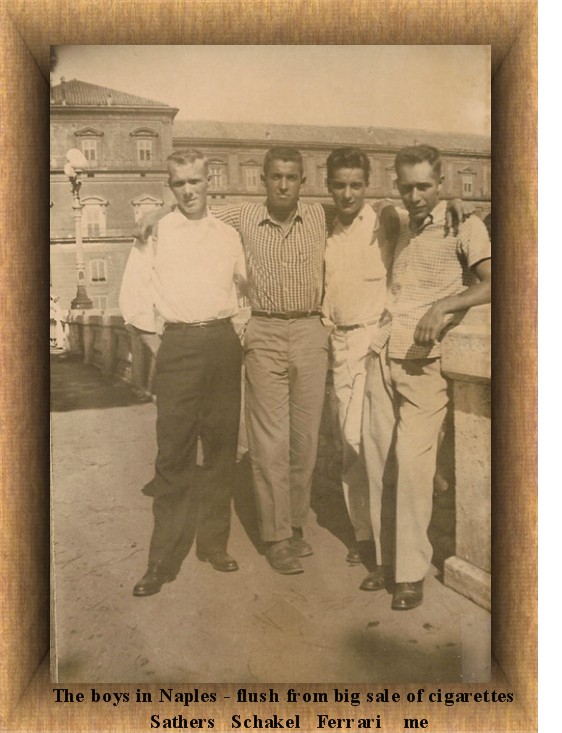
Lucky did own a bar in Naples that we visited called the "Snake Pit". However, we spent most our time in the Seaman's club in Naples.
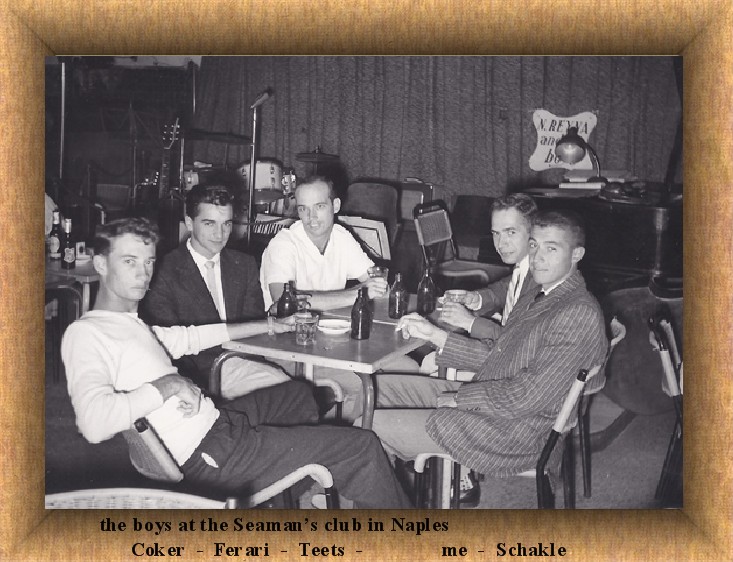
which was pretty nice and a lot cheaper.
This third and last cruise to the Med was when Mark was two months old. When I left he had hair and when I returned he was four months and had gotten big and bald. On seeing him I jokingly exclaimed "Who is that fat, bald kid?"
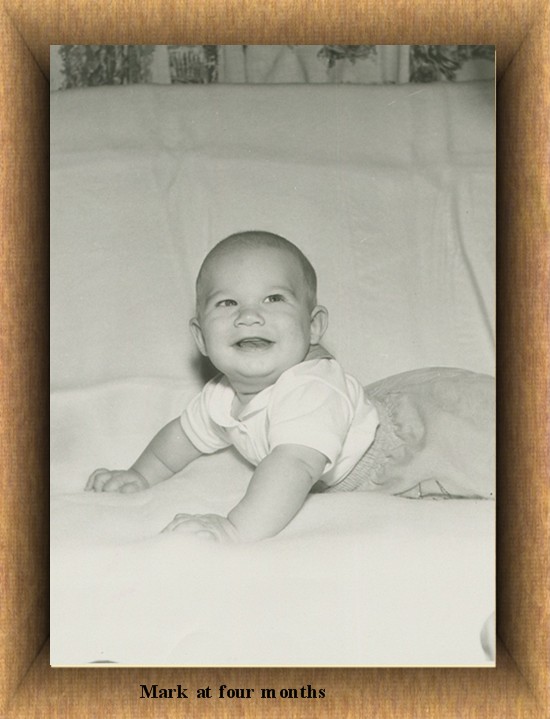
I didn't fully appreciate the maternal instinct. His mother was not amused! In fact, it was a new addition to the folklore that was to be told and retold to generations for years to come. Actually, he was a cute boy and we enjoyed him a lot. After our early difficulties feeding him, we had purchased a Dr. Spock book and we used that as our bible for taking care of Mark. Dr. Spock later changed his attitude on discipline for the worse, but his first book was very good. I made lots of mistakes in disciplining my children and wish I had it to do over. I do not believe that excessive physical punishment is excusable. However, I believe that failing to discipline is child abuse ever bit as much as excessive physical punishment and I have observed that far more children are abused by lack of discipline than by excessive discipline. The damage done by neglect lasts much longer.
In addition to the three deployments to Malta, I made one deployment to Iceland , one to Newfoundland and one to Puerto Rico. During the prep for shooting Alan Shepherd into space one of the concerns was finding him if he didn't land where he was supposed to. The first shot was going to be a chimpanzee and we were part of the team to find it. So we flew many flights up and down the east coast to practice finding planted radios, usually in a moving car. Then we flew to Roosevelt Roads, PR on 19 Feb 1961 and we were available for a search if necessary, which it wasn't. A couple of stories about the Puerto Rico trip. One is they made great rum and cokes in the NCR club. Not much coke! A second was I bought gifts for the three back home. I don't remember what I got Mark. I got Birdie a Spanish fan. I got Teresa a doll of a Spanish dancer. Birdie said don't give it to her, she would just destroy it (She was not even one). So, I kept it for a few years, then I gave it to her. She tore it up!
The trip to Iceland had one interesting story. My friend from Eagle Point (Oregon), Cliff Sands, was with me and we spent some time in the NCR club at the Navy Base near Keflavik. They had two for one drinks for happy hour so we would order and drink one and save one. He drank vodka Collins and I drank rum and coke. When happy hour was over, our table was full of drinks and when we were done with those we were pretty much done also. Then we just had to find our way back to the barracks.
The Naval Air Base there shared the runways with the commercial airport and the terminal was nearby. Sands and I and some others were in the terminal when a Russian military transport landed and the officers from the plane came into the terminal. There was a room for coats just outside the door to the restaurant in the terminal and these Russians all took off their gold braided hats and lined them up on a shelf above the coats. Sands and I wanted real bad to steal one of those Russian hats and we stared at them for a long time and tried to get up the courage but we were afraid we might cause an international incident so we chickened out. In retrospect it was a once in a lifetime missed opportunity.
The squadrons that deployed regularly to Argentia, Newfoundland to fly the barrier
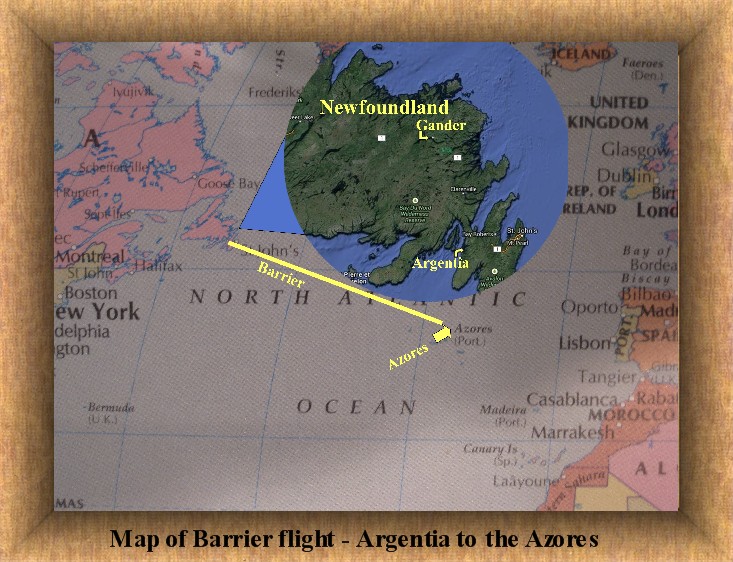
continually whined about how tough it was so our squadron deployed an occasional plane to relieve them. We deployed there in Feb 1959 and we planned to stay two weeks and fly six barrier flights. The barrier flights were about 12 hours. The flight went almost to the Azores and then back. There were four destroyers (pickets)
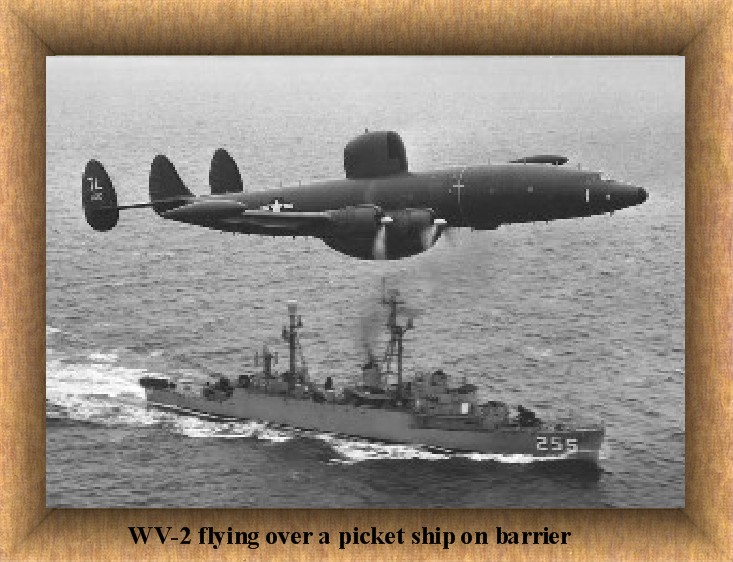
along the route that we communicated with. We never saw a plane on any of the flights except other WV-2s, it was boring. It added a bit of daring when they told us if we went down in that water in the North Atlantic we wouldn't last long (two or three minutes as I recall) because of hypothermia. On one flight in our deployment it was snowing when we returned, and we hit a snowpack and broke one of the lights off on the bottom of our plane. The snow was so deep on the base that as we road the buses around the snow was piled up much higher than the bus and you could see nothing on either side but snow, dirty snow. During the time we were on the ground in Argentia, several of us spent our time playing basketball. They had several gyms and we were allowed to commandeer one and six of us played basketball for hours. On our fifth flight it continued snowing until they closed the runways behind us. So, we were diverted to an Air Force base at Gander, Newfoundland and we only had time to refuel and resupply and go back up in order to maintain the barrier. The barrier had to be covered at all times. So we were flying almost thirty hours straight. We got done with our deployment sooner that way.
Lexington Park was like a 'Peyton Place'. When one of the barrier squadrons would deploy to Argentia for six months, most of the wives were left behind. That coupled with a large number of single, bored sailors on the base made for interesting times. One occasion I recall was a sailor who came back unexpectedly and found a babysitter at his house and his wife on the town. He waited and surprised them and took his revenge. Them to the cemetery and him to the brig.
There was a radio station nearby that played western music and from that station I heard George Jones for the first time. I was still looking for a replacement for Hank Williams and George sounded a bit like him. I don't remember what songs I heard by him in those days but it may have been "Just One More"
We had some cats during our time in Maryland. The first was an orange striped cat we named Gideon. Gideon was a crazy old fellow in a movie we had seen. Gideon in the movie would come out on his rock as people went by and he would yell some homily to them and end it with "Yes says I says Gideon!" We were fond of him and we named our first cat after him and used his saying the rest of our lives. Anyway, Gideon was a fine cat except for one thing. There was a navy family living near us who had two little girls and the two little girls had a sand box and Gideon loved the sand box. The father of the girls was not happy with what Gideon did in his girl's sandbox. Gideon just disappeared one day.
But we were one step ahead of them. Birdie had picked up this tiny little kitten at the store. He was young and had not been taught to even clean himself. We were intrigued with the strange names of my Strader great uncles, so we named this cat after my great uncle Alfred Alfonso Ebenezer Strader and we just called him Ebenezer. After the disappearance of Gideon, we also got a cat that we named after another great uncle, Simon Sylvester Able Chester Strader, and we called him Sylvester. Sylvester didn't cotton to the bad grooming of Ebenezer, so he cleaned him up. Ebenezer, like Gideon, liked the nice clean sand box and like Gideon, Ebenezer mysteriously disappeared. Apparently Sylvester had observed the capture of Ebenezer because he would never go near the sand box after that. We had Sylvester a long time and moved him to Tanner with us. However, he fell out of favor during Birdie's pregnancy with Teresa and when she found his dish full of maggots, he had to go. One day he was given to an unsuspecting farm family on one of the country roads where we often took rides.
After I had been at PAX a few months, I tired of playing acey-deucy (probably had worked my way through all the competition) and I got a job working in the Operations office. The operations office kept all the pilot log books up to date. We also typed and disseminated the crew lists and did general typing of operations documents that had to be sent to the Atlantic Fleet Headquarters. The office was ran by a CPO who had been in WWII and was on the last year of his career; WWII veterans were given 20-year retirements after 18 years and six months. There were four or five of us ACW types (ACW was the designation for airborne radar operators) that did the Operations peon work. It was pretty good duty. When I came there I was an Airman (E3) and low man on the totem pole. Every Friday we cleaned up the office and I got the worst jobs. There was one negro (actually he was only part negro and no reasonable person would have considered him any different from any of the rest of us) in the office who was E4 and he gave me a hard time from the beginning. He wasn't a bad guy and we got along okay but he liked to make sure everyone below him knew he had authority over them, and I was below him. When I made 3rd class (E4) he was still senior to me and still let me know. When it was posted that I had made 2nd class (E5) and he hadn't, he applied for and got transferred before the new ranks took effect. The times between grades at that time were: You became E2 when you got out of boot camp and you could not be E3 until you had I think 8 months in the service. Then you had to be E3 for 6 months before becoming E4 and another year to be E5. I made all of these in as short of time as possible. Also, the military came up with an idea to pay extra for proficiency (as measured by tests) and I earned proficiency pay from the first time it was offered until I was discharged.
After I made 2nd class I was leader of the group in Operations. Not really the leader since there was a CPO in charge but both CPO's during my tenure were old WWII veterans waiting to retire. So, they were gradually easing into retirement and they let me do almost all of the leading. I was able to bring some of my friends (Loren Sathers III, Sam Ferari, Walt Bauer and Howard Craft) to work with me and we all got along well and worked well together. We were on the same CIC crew most of the time and during two trips to the Mediterranean. Sathers was from Duluth (his father owned a hardware store) and he was a bit of a free spirit. He developed an addiction to gambling while there (that county of Maryland had open gambling) and we tried to help him through that. Bauer was from Nebraska and we made contact again while I was in Colorado Springs and he was living there also. We didn't have much in common then and the contact was dropped by us both. Sam Ferari and I still email occasionally. He was from Pittsburg and he went back and had a successful career and now splits his time between Florida and Pittsburg. The picture of me and Sam at Pisa was interesting.
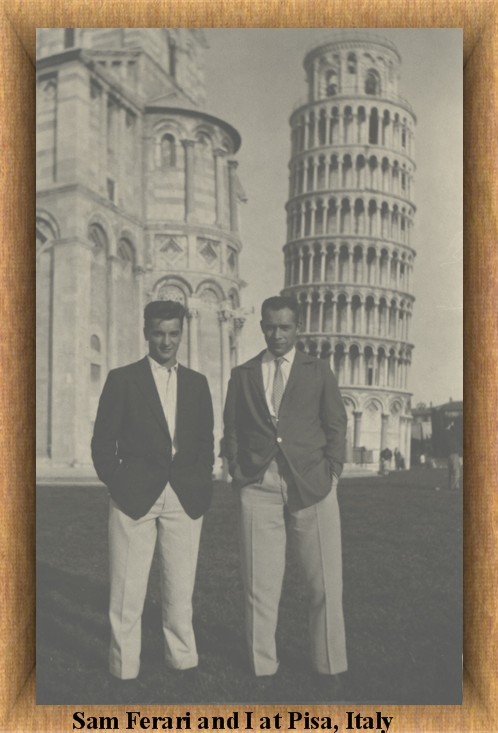
We were wandering around the grounds of the Church and the Leaning tower and this old woman tried to get us to let her take our picture. She was carrying an old wooden camera like we see in the old western movies and she had everything with her to develop the pictures. We first put her off since we didn't think she could possibly do good work, but she persisted, and we finally paid a small fee to have her do it. In a short time she had the pictures completed and gave them to us. She had done a great job of framing the picture and the picture was clear. More amazing, it has lasted over 50 years with minimal fading. She must have been a very skilled craftswoman. Sam recently sent me a picture of him in front of the sign where the old Glynco base once was. Craft was the only other married one and more about him later.
Housing was always something Birdie and I wanted to improve. We had started high (Chinlee drive) and had to downscale (to the duplex at Springhill) and that is always hard. The trailer was our first move up. We heard talk about base housing, but you had to be E5 to get that. Soon after I made 2nd class our number came up and we got the house at 66 Tanner. Mark was about 5 months old. This was not housing on the base but civil service housing off the base that was managed by the Navy. They were duplexes made out of plumbing block and were pretty basic, but we liked it. We did have to buy appliances because what we had been using belonged to Springhill. Birdie had done the laundry in a central laundry facility. Now we needed a washer. There was a fellow who ran a used appliance store that got pretty much all the enlisted Navy business. He was pretty good. You picked out the appliance you wanted and for a small down payment he added your name to his book, and you made payments on the rest. His book was big. No interest and he trusted people to pay and generally they did. I don't know where he got all the used appliances, but he had lots. We bought a washer from him and used it for quite a while after we came back Oregon. We never had a dryer in Maryland, Birdie hung the clothes on the line. During the winter the diapers would often freeze and break off the corners. We also got credit from Sears and bought some cheap but new furniture that included a bedroom set, a sectional couch and a dining table and chairs. The dining table wasn't so sturdy. I stood on the table to hang something (I didn't have a ladder and the chairs were not high enough) and all four legs gave at once and the table crashed to the floor with me still aboard. Turns out the table was made from some type of pressed board and the legs were just held with wood screws. A chunk of the table had come out with the screws, so I reattached them in a different spot. Not quite as attractive as having the legs mounted in the corner, but it worked. I was becoming a functional, if not aesthetics, repair guy. Sometime after we had moved to Tanner, the neighbors were transferred and they had a small fence for their kids to play and they suggested I come and get the fence before they left because otherwise it was whoever got it first. So I did and it worked out as a nice little place for Mark and Teresa to play the rest of our time in Maryland
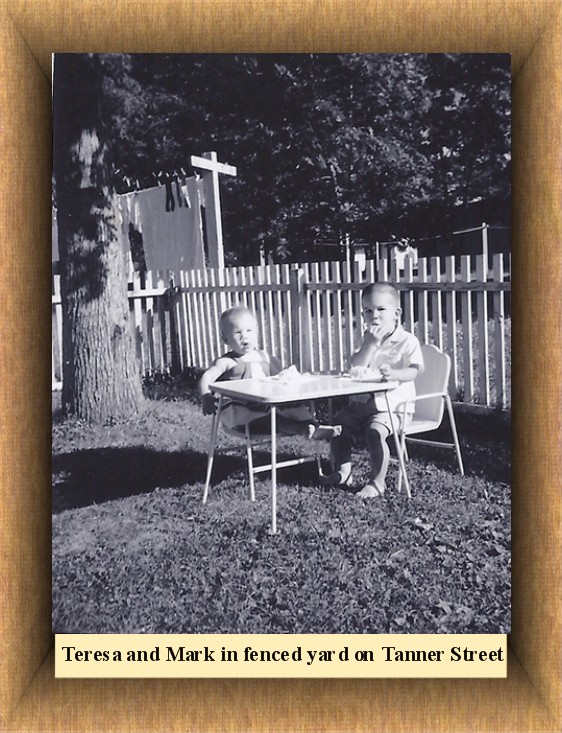
When I came back from my last cruise to the Med, Mark had gone bald but his hair soon grew back and, although not shared by all, some thought it was time for a haircut, especially those of us who had military cuts. Others definitely did not! Well one day the stars all aligned. Birdie and I were visiting our friends from New Mexico, Howard and Mary Craft. Howard was another ACW. Clothes in the Navy were stenciled with the owner's initials and last name. Craft's initials were H.P. and several of us had nicknamed him "Horsepower". So what stars were aligned? Well first Horsepower and I had a few drinks, then maybe a few more. Second both Horsepower and I had been through the navy haircutting experience a number of times, so though not licensed, we were certainly qualified barbers in our own right. Third we both agreed Mark needed a haircut. So, Horsepower gathered up his haircutting equipment and I gathered up my boy and we mustered in the locked bathroom. The protests from outside the door were incessant, and as Mark started to whimper, they became loud and threatening. This, no doubt, was the cause of our losing focus on occasion and resulted in future, false accusations of alleged nicks in the haircut. Actually Horsepower and I gave Mark a fine first haircut.
[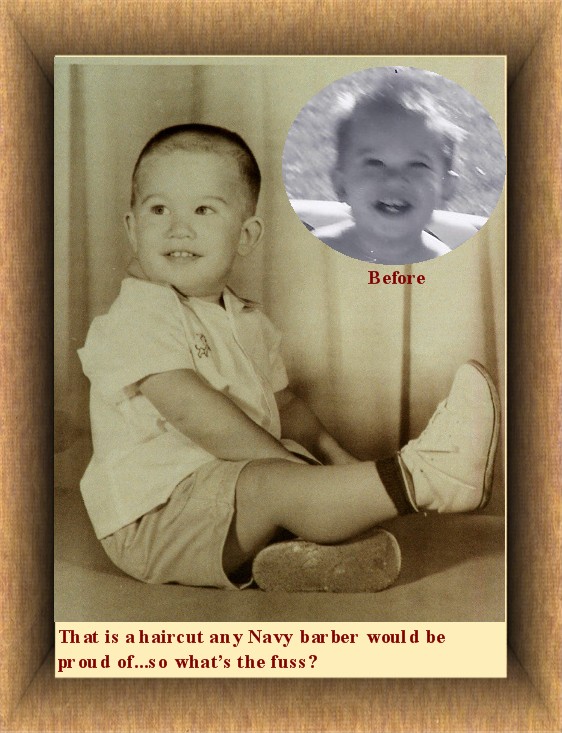
and although he may have been psychologically scarred for life he came through it with no permanent physical damage. To this very day this story is told with more drama and condemnation each time. That is why I would never bring it up. Howard and Mary were an attractive couple and he was a 3rd class petty officer when I got out. We heard later that they had gone back to New Mexico and gotten divorced.
I played basketball on our squadron (AEWRON TWO) team. It was a mix of officers and enlisted. We had several college grad basketball players who were really good, one from either U of Virginia or West Virginia. I was sixth man. We won the championship of PAXRIVER.
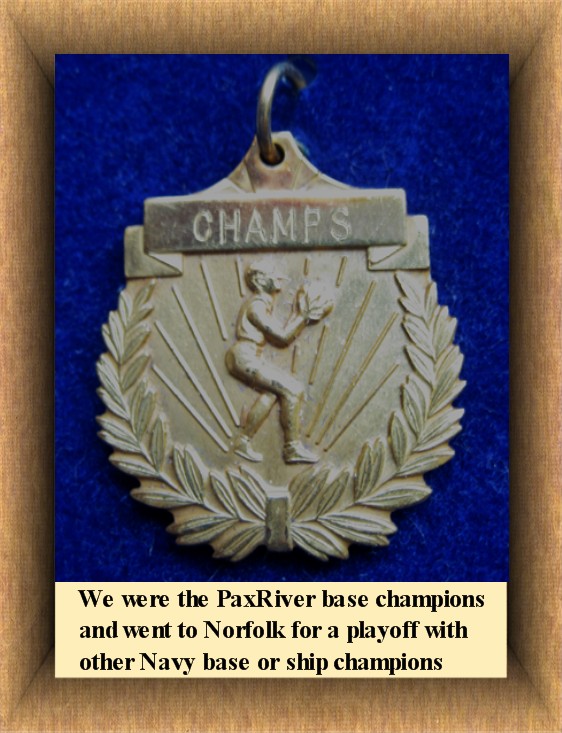
and flew down to Norfolk for a play off with championship teams from other bases and some ships. We lost the championship game to a team from an aircraft carrier (I think the Valley Forge).
The winters in Maryland were quite cold. From our house on Tanner, we could walk downtown. One time we took Mark in the stroller (he loved walks in the stroller) and we were walking toward town and it was so cold he didn't like breathing the cold air.
He would try to not breath, then have to breath and get mad. We thought it was cute. He survived! We planted flowers in the spring and we were expecting again. When Teresa was born and I first saw her, I exclaimed: "She is cuter than a bugs ear!"
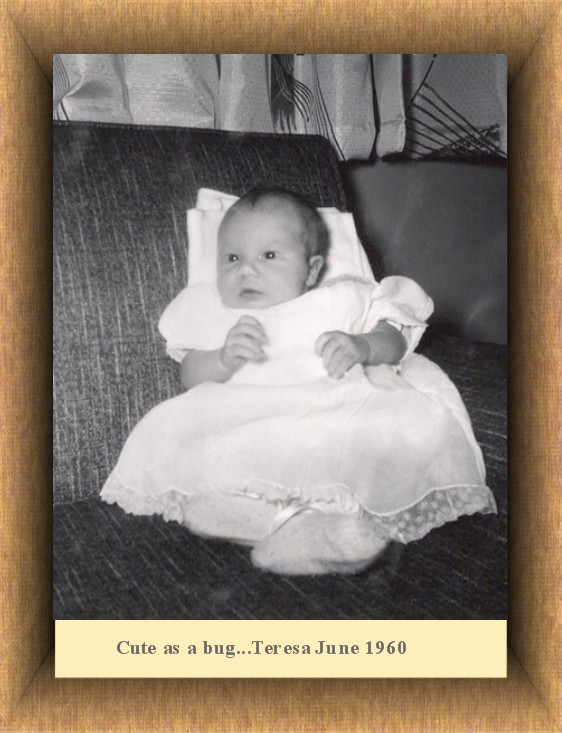
I don't know where I had picked up that expression, but she was. I gave her 'Bug' (sometimes Buggity Ann) as a nickname for several years. Birdie and I had recently gone to the movie, "The Miracle". The movie was about a nun who fell for a soldier and deserted from her convent to follow him. But the statue of Mary in the convent took her place (The Miracle) until she finally returned. We were impressed with the name Teresa. However, probably no one, including us, was ever able to pronounce it as well as in the movie, except George. We were veterans by now and Teresa ate like a trooper. In fact, she often ate so fast she spit up. But she grew and soon Mark was pushing her around in the stroller.
He liked pushing her, but we had to watch him because he also liked to give her things to eat, things he found on the ground. He apparently knew what he was doing because she liked it and thrived on it; even though the stuff he found was often near where we kept the garbage can.
We bought an 8mm movie camera about this time. It was French and had three lenses on a turret. After you exposed a roll of film, you had to mail it to get it developed, so we took a few rolls before we saw the results of the first. It was obvious we needed a light! So, I bought a light bar that in those days was four flood lights mounted on a bar. It was bright. Mark hated the lights. So, the dilemma was get dark pictures or pictures of the kids trying to turn away from the light. I made a title for our movies, "Let us Learn" which had a double meaning of learning how to be parents and how to take movies. We are still working on both.
We bought Mark a small tricycle, maybe at Christmas or his second birthday. He had trouble with the concept of pushing on one pedal and not on both. So, we worked with him about lifting one foot and pushing with the other. He got it so good that when he pedaled he exaggerated lifting one completely off the pedal. We were amused.
For Christmas Santa gave Mark a gun and holster set. Unbeknown to me there was apparently some gun fighter genes in our family, Mark took to the fast draw naturally.
Of course, once he had it drawn he knew just what to do with it - put it in his mouth!
When Matt was born I was on a flight.
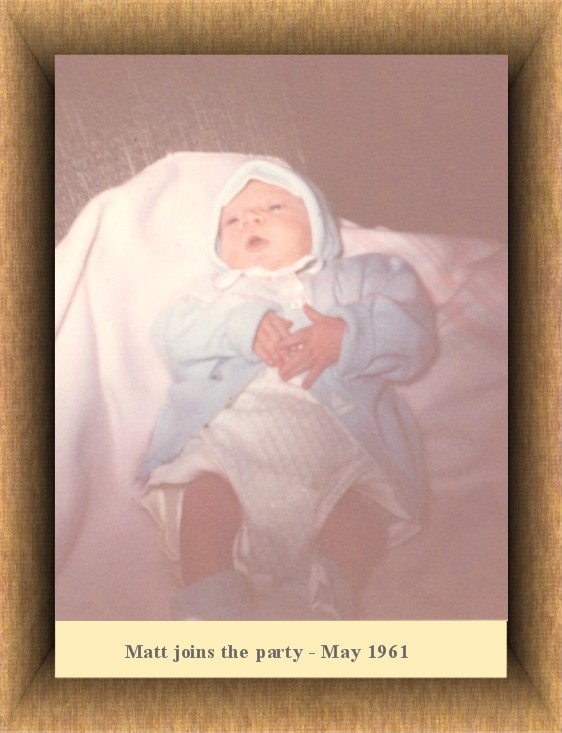
We knew Birdie was close but didn't think she was that close. She had a routine doctor's appointment that day and the process was to have everyone come at twelve for appointments that started at one and take them in the order they came in. Birdie had taken Mark and Teresa to the nursery while she had her appointment. When they called her up to be weighed, she grabbed her stomach and the nurse asked her if she was in labor and Birdie said no, it was just a gas pain. Later when she went into the doctor, he sent her down to have the baby. Birdie worried to the nurses because Mark and Teresa hadn't had lunch and I was flying until they were annoyed. After Matt was born, the nurse she had told about the gas pain came down and told her it was the biggest gas pain she had ever seen! I was supposed to meet Birdie at the hospital after my flight and ride home with her, but I forgot and got a ride home. I was a bit peeved that the house was such a mess and was cleaning when they called and told me we had a boy. I was happy! I got down to the hospital and saw Birdie and rescued Mark and Teresa from the nursery. While I was visiting with Birdie, another father who had just had his seventh told his wife, "Let's go down and see what our love has made." We were impressed and Birdie remembered it when David was born. When it was time to bring Birdie and Matt home, Mark and Teresa and I went down and picked them up. We had quite a family. We were already thinking of our trip back to Oregon.
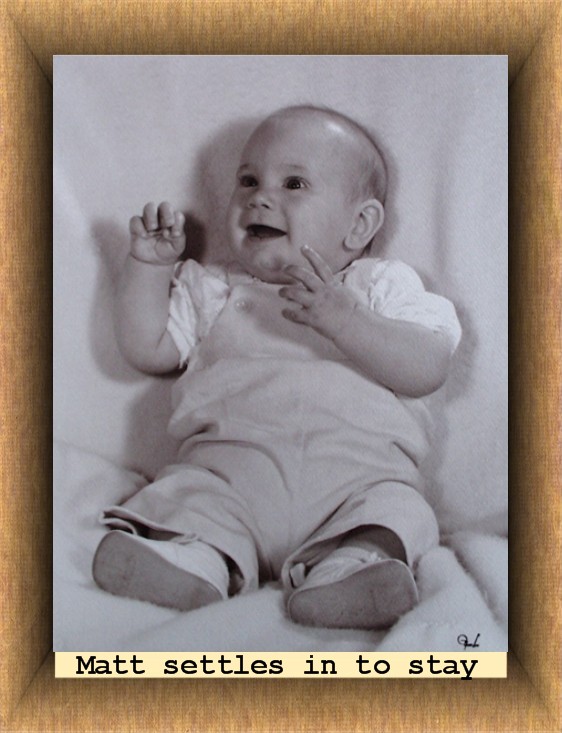
Teresa never learned to crawl correctly, she crawled on her elbows and not her hands, although she could do it right and did occasionally. She walked by the time she was one!
Birdie had taught both Mark and Teresa what the different parts of their bodies were by telling them a little ditty she got from her Daddy Nettleton about "Fore bumper, eye winker, Tommy Tinker, nose blower, mouth eater, chinny chopper and gully gully gully" as she touched their forehead, right cheek near the eye, left cheek, nose, mouth, chin and stomach. So when Matt was a few weeks old they proceeded to teach him , not so gently. His life was in peril, but I could do
nothing since I had the camera. I suppose sometimes we were amused when we should have been panic stricken!
One of the issues we had for our trip home was that the transmission on our Oldsmobile was starting to misbehave. It was difficult to get it to shift. It may have only needed adjustment but my experience with automatic transmissions was nil and I thought it was probably going out and I better get rid of it while it still ran. So, a friend and I drove it up to a huge used car lot located in Pennsylvania near where the three states of Pennsylvania, Maryland and Delaware come together. The location was not accidental. I was able to trade for a 1955 Mercury station wagon (had a big family now) and we drove it to Delaware to consummate the deal to avoid sales taxes. When I got it home and started to clean it up for the trip home, I found that the floor in front of the back seat had rusted out. I had to find scrap metal and rebuild the floor and paint it. I also discovered it had a four-barrel carburetor which I decided to put a kit in before we left. It turned out the carburetor was far more complex than I had bargained for and was a very poor choice for one's first carburetor rebuild. I managed to get it running again and we were ready to go. We were concerned about the baby making the trip (Matt was only six weeks old) but the doctor told Birdie that Matt would have an easier time than her, and he was right. We bought a little fold up car bed for him to ride in. Mark and Teresa played and slept in the back with the seats down.
Birdie's brother, Bob,
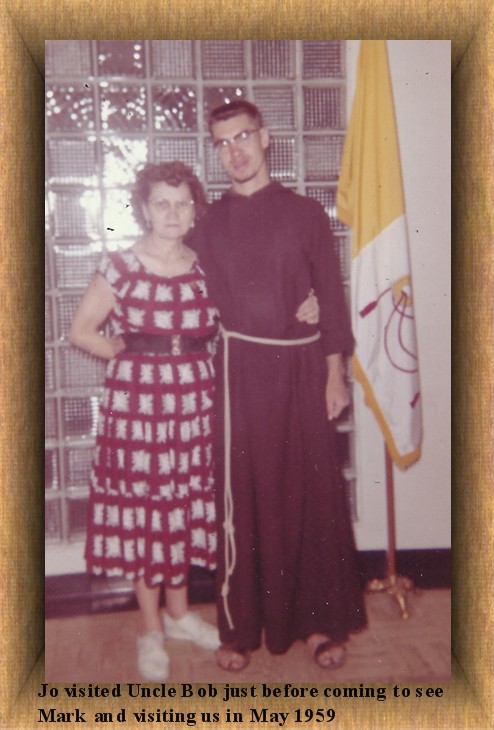
had been in the seminary in Massachusetts and had decided to drop out and go back to Oregon, so he joined us for the ride back. We had been communicating with him for awhile before that and he had sent us the Baltimore Catechism books which we had gone through, with him answering our questions as we did. That was our first real exploration of Catholicism.
The navy normally put a full court press on guys getting out to get them to reenlist, especially someone who had made E5 in just over two years, but I had had a running discussion on my views on the Navy through suggestion boxes which the Personnel officer had put up. He made several comments to me that indicated he knew who was sending the suggestions. Consequently, he didn't even bother to go over the reenlistment stuff with me. There was one officer who I got along with really well, LTJG Toomey, who was from Massachusetts and basically shared my views and was just waiting to get out and go back and become a teacher. His feelings on the Navy were similar to mine. One time when I was supposed to go on a flight, I overslept. He grabbed one of the crew who knew where I lived, and they drove to my house in their flight suits and got me up and took me in so I avoided some serious trouble. He was a special officer and friend. By 1961 the navy was moving to shipboard ACW planes and they had decided to end AEWRON TWO. Consequently, they let me out almost two months early. I did receive a 1000 hour pin
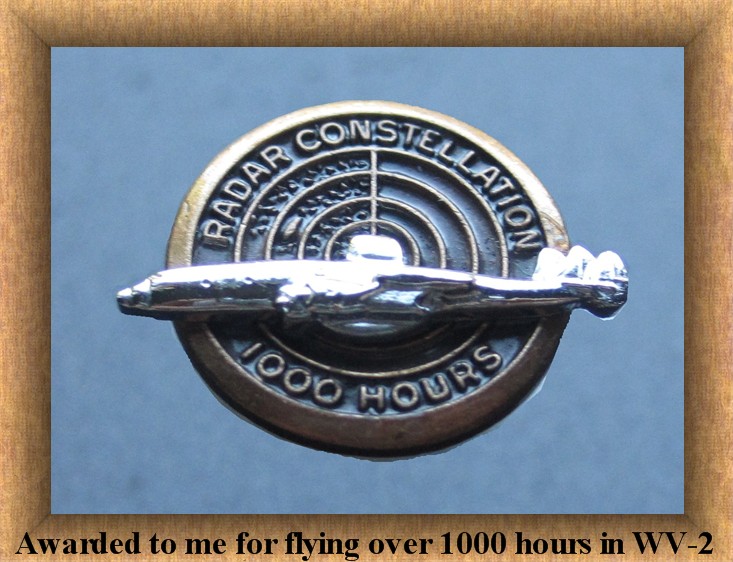
for having spent over 1000 hours flying in WV-2's. By the end of June, we had said our goodbyes, loaded up our station wagon and headed west to Oregon.
I don't recall the exact route we took back to Oregon, but a few stories will give the general idea. We were conserving our money of which we had very little, so we drove most nights and only spent about two or maybe three nights in motels. We did go through West Virginia and into Illinois. The carburetor started to malfunction almost immediately and the poor judgment of putting in the kit became obvious. When it got so bad that I felt I needed to take action, we pulled over in Springfield (I think it was) and started looking for a parts store. Someone up there loved us, we were parked across the street from a factory that either built or rebuilt (or both) the very carburetor we had. I purchased a rebuilt carburetor, installed it and we were off again. The only other car problem we had along the way was the extreme heat in the Midwest (it hovered every day around 100) which caused the transmission to get so hot we could hardly put our feet on it. In addition to the discomfort, I was worried about whether the transmission could withstand it.
Our babies were doing fine. We had to spend a night somewhere near Illinois/Missouri to rest and more importantly make bottles for Matt. This was the time most of the freeway system was being completed and I was struck with the maze of clover leaves as we passed by Kansas City. We bought some toys in Missouri to keep Mark and Teresa entertained. In Kansas, we got our first and thankfully only experience with a dust storm. We were in the middle of nowhere and it was hot and humid. Suddenly we could see this dark, brown cloud way ahead in the distance and it kept getting bigger and closer. When we were in it the visibility was terrible and a layer of dust settled on everyone and everything, even our little baby. We survived and we stopped somewhere outside the storm and cleaned up, but I doubt we saw the last of the dust until we traded off the car in Oregon.
It seems like we may have stayed a night in Colorado but its unclear (that track of the hard drive has had too many birthdays!) When we left Denver, we started up into the Rockies. Somewhere in the middle of the mountains, I was driving, and we were descending pretty abruptly when we came to some construction. The flag man was letting cars go in front of me but well before I got to him, he put up the stop sign. I pushed on the brakes but they had overheated and did not respond at all. I passed him without slowing down and proceeded down the construction area dodging around equipment and work areas at a high rate of speed. We finally reached a flat area and I was able to get it stopped so the brakes could cool. It was a good lesson in how not to depend only on your brakes when making long descents. I'm still paranoid about that.
We made our last overnight stop in Salt Lake City. We had to make bottles for Matt. We planned on making the rest of the trip without stopping for rest, so we bought some "no doze" pills. All three of us were sharing the driving. One had the option of trying to sleep and the other two kept each other awake. Several things came together to produce less than optimal results. First, we were all getting tired. Second we were all doped up on "no doze" which I think was probably a strong caffeine pill. Third, Bob used this time to start a discussion on the woman's place in a marriage. Other than being the wrong time and the wrong message, it was noble. Birdie was not impressed nor has she ever been reluctant to express her views on this topic. I think we were all at each other's throats when we finally came into Oregon and we could see the snow-capped mountains in the distance. We went by Crater Lake and then on to Bandon.
LINK TO
CH5_story
LINK TO